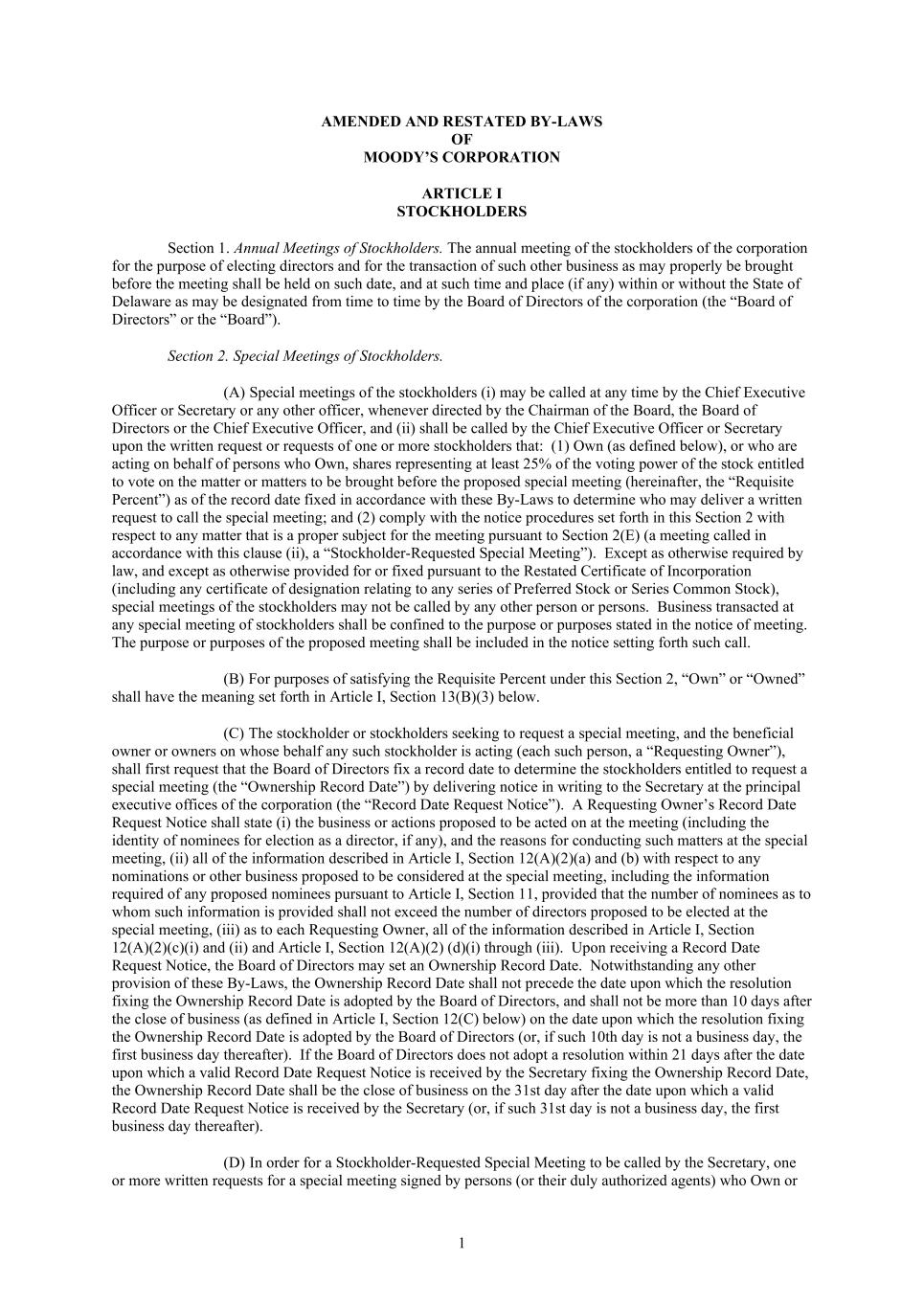
1 AMENDED AND RESTATED BY-LAWS OF MOODY’S CORPORATION ARTICLE I STOCKHOLDERS Section 1. Annual Meetings of Stockholders. The annual meeting of the stockholders of the corporation for the purpose of electing directors and for the transaction of such other business as may properly be brought before the meeting shall be held on such date, and at such time and place (if any) within or without the State of Delaware as may be designated from time to time by the Board of Directors of the corporation (the “Board of Directors” or the “Board”). Section 2. Special Meetings of Stockholders. (A) Special meetings of the stockholders (i) may be called at any time by the Chief Executive Officer or Secretary or any other officer, whenever directed by the Chairman of the Board, the Board of Directors or the Chief Executive Officer, and (ii) shall be called by the Chief Executive Officer or Secretary upon the written request or requests of one or more stockholders that: (1) Own (as defined below), or who are acting on behalf of persons who Own, shares representing at least 25% of the voting power of the stock entitled to vote on the matter or matters to be brought before the proposed special meeting (hereinafter, the “Requisite Percent”) as of the record date fixed in accordance with these By-Laws to determine who may deliver a written request to call the special meeting; and (2) comply with the notice procedures set forth in this Section 2 with respect to any matter that is a proper subject for the meeting pursuant to Section 2(E) (a meeting called in accordance with this clause (ii), a “Stockholder-Requested Special Meeting”). Except as otherwise required by law, and except as otherwise provided for or fixed pursuant to the Restated Certificate of Incorporation (including any certificate of designation relating to any series of Preferred Stock or Series Common Stock), special meetings of the stockholders may not be called by any other person or persons. Business transacted at any special meeting of stockholders shall be confined to the purpose or purposes stated in the notice of meeting. The purpose or purposes of the proposed meeting shall be included in the notice setting forth such call. (B) For purposes of satisfying the Requisite Percent under this Section 2, “Own” or “Owned” shall have the meaning set forth in Article I, Section 13(B)(3) below. (C) The stockholder or stockholders seeking to request a special meeting, and the beneficial owner or owners on whose behalf any such stockholder is acting (each such person, a “Requesting Owner”), shall first request that the Board of Directors fix a record date to determine the stockholders entitled to request a special meeting (the “Ownership Record Date”) by delivering notice in writing to the Secretary at the principal executive offices of the corporation (the “Record Date Request Notice”). A Requesting Owner’s Record Date Request Notice shall state (i) the business or actions proposed to be acted on at the meeting (including the identity of nominees for election as a director, if any), and the reasons for conducting such matters at the special meeting, (ii) all of the information described in Article I, Section 12(A)(2)(a) and (b) with respect to any nominations or other business proposed to be considered at the special meeting, including the information required of any proposed nominees pursuant to Article I, Section 11, provided that the number of nominees as to whom such information is provided shall not exceed the number of directors proposed to be elected at the special meeting, (iii) as to each Requesting Owner, all of the information described in Article I, Section 12(A)(2)(c)(i) and (ii) and Article I, Section 12(A)(2) (d)(i) through (iii). Upon receiving a Record Date Request Notice, the Board of Directors may set an Ownership Record Date. Notwithstanding any other provision of these By-Laws, the Ownership Record Date shall not precede the date upon which the resolution fixing the Ownership Record Date is adopted by the Board of Directors, and shall not be more than 10 days after the close of business (as defined in Article I, Section 12(C) below) on the date upon which the resolution fixing the Ownership Record Date is adopted by the Board of Directors (or, if such 10th day is not a business day, the first business day thereafter). If the Board of Directors does not adopt a resolution within 21 days after the date upon which a valid Record Date Request Notice is received by the Secretary fixing the Ownership Record Date, the Ownership Record Date shall be the close of business on the 31st day after the date upon which a valid Record Date Request Notice is received by the Secretary (or, if such 31st day is not a business day, the first business day thereafter). (D) In order for a Stockholder-Requested Special Meeting to be called by the Secretary, one or more written requests for a special meeting signed by persons (or their duly authorized agents) who Own or
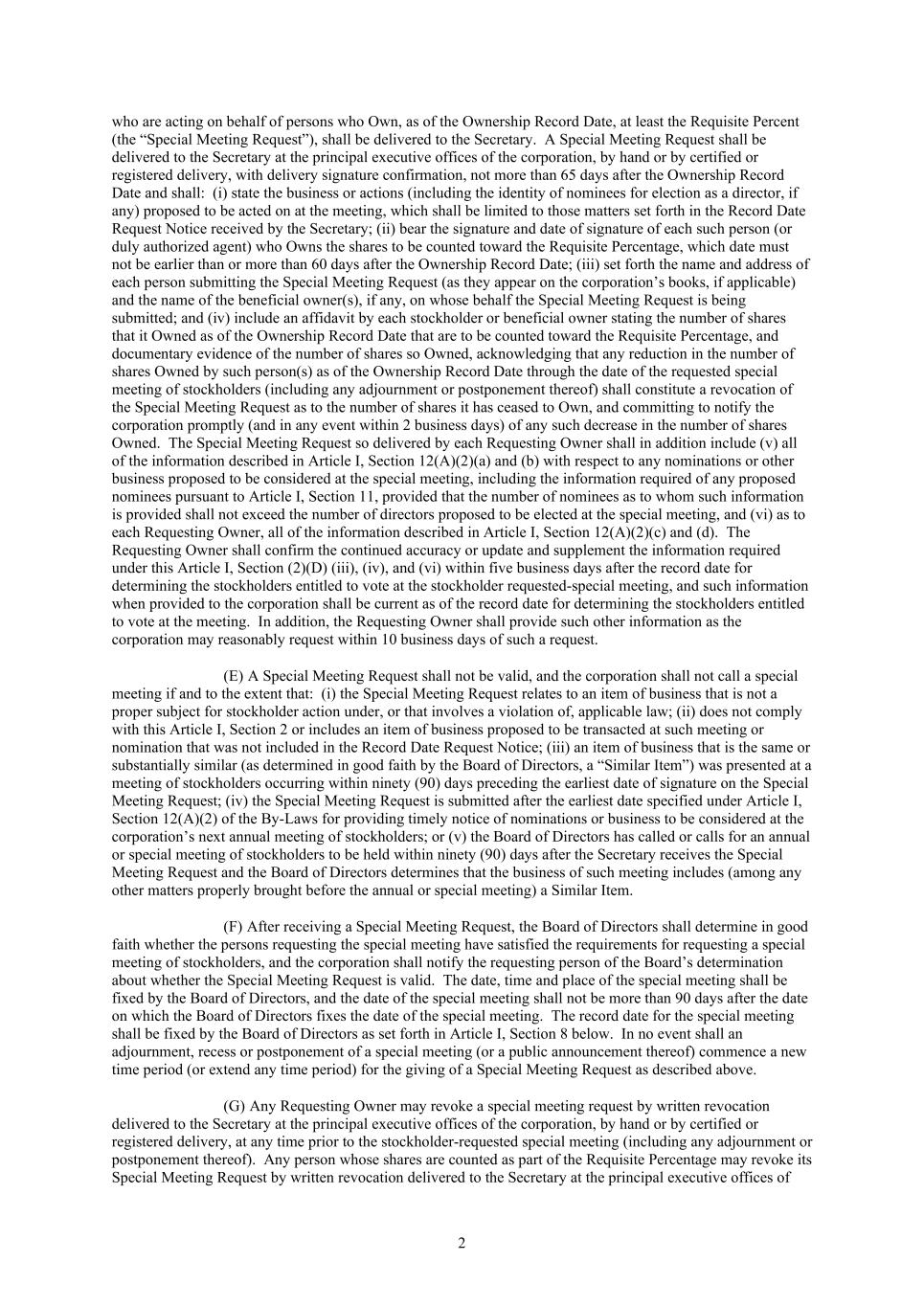
2 who are acting on behalf of persons who Own, as of the Ownership Record Date, at least the Requisite Percent (the “Special Meeting Request”), shall be delivered to the Secretary. A Special Meeting Request shall be delivered to the Secretary at the principal executive offices of the corporation, by hand or by certified or registered delivery, with delivery signature confirmation, not more than 65 days after the Ownership Record Date and shall: (i) state the business or actions (including the identity of nominees for election as a director, if any) proposed to be acted on at the meeting, which shall be limited to those matters set forth in the Record Date Request Notice received by the Secretary; (ii) bear the signature and date of signature of each such person (or duly authorized agent) who Owns the shares to be counted toward the Requisite Percentage, which date must not be earlier than or more than 60 days after the Ownership Record Date; (iii) set forth the name and address of each person submitting the Special Meeting Request (as they appear on the corporation’s books, if applicable) and the name of the beneficial owner(s), if any, on whose behalf the Special Meeting Request is being submitted; and (iv) include an affidavit by each stockholder or beneficial owner stating the number of shares that it Owned as of the Ownership Record Date that are to be counted toward the Requisite Percentage, and documentary evidence of the number of shares so Owned, acknowledging that any reduction in the number of shares Owned by such person(s) as of the Ownership Record Date through the date of the requested special meeting of stockholders (including any adjournment or postponement thereof) shall constitute a revocation of the Special Meeting Request as to the number of shares it has ceased to Own, and committing to notify the corporation promptly (and in any event within 2 business days) of any such decrease in the number of shares Owned. The Special Meeting Request so delivered by each Requesting Owner shall in addition include (v) all of the information described in Article I, Section 12(A)(2)(a) and (b) with respect to any nominations or other business proposed to be considered at the special meeting, including the information required of any proposed nominees pursuant to Article I, Section 11, provided that the number of nominees as to whom such information is provided shall not exceed the number of directors proposed to be elected at the special meeting, and (vi) as to each Requesting Owner, all of the information described in Article I, Section 12(A)(2)(c) and (d). The Requesting Owner shall confirm the continued accuracy or update and supplement the information required under this Article I, Section (2)(D) (iii), (iv), and (vi) within five business days after the record date for determining the stockholders entitled to vote at the stockholder requested-special meeting, and such information when provided to the corporation shall be current as of the record date for determining the stockholders entitled to vote at the meeting. In addition, the Requesting Owner shall provide such other information as the corporation may reasonably request within 10 business days of such a request. (E) A Special Meeting Request shall not be valid, and the corporation shall not call a special meeting if and to the extent that: (i) the Special Meeting Request relates to an item of business that is not a proper subject for stockholder action under, or that involves a violation of, applicable law; (ii) does not comply with this Article I, Section 2 or includes an item of business proposed to be transacted at such meeting or nomination that was not included in the Record Date Request Notice; (iii) an item of business that is the same or substantially similar (as determined in good faith by the Board of Directors, a “Similar Item”) was presented at a meeting of stockholders occurring within ninety (90) days preceding the earliest date of signature on the Special Meeting Request; (iv) the Special Meeting Request is submitted after the earliest date specified under Article I, Section 12(A)(2) of the By-Laws for providing timely notice of nominations or business to be considered at the corporation’s next annual meeting of stockholders; or (v) the Board of Directors has called or calls for an annual or special meeting of stockholders to be held within ninety (90) days after the Secretary receives the Special Meeting Request and the Board of Directors determines that the business of such meeting includes (among any other matters properly brought before the annual or special meeting) a Similar Item. (F) After receiving a Special Meeting Request, the Board of Directors shall determine in good faith whether the persons requesting the special meeting have satisfied the requirements for requesting a special meeting of stockholders, and the corporation shall notify the requesting person of the Board’s determination about whether the Special Meeting Request is valid. The date, time and place of the special meeting shall be fixed by the Board of Directors, and the date of the special meeting shall not be more than 90 days after the date on which the Board of Directors fixes the date of the special meeting. The record date for the special meeting shall be fixed by the Board of Directors as set forth in Article I, Section 8 below. In no event shall an adjournment, recess or postponement of a special meeting (or a public announcement thereof) commence a new time period (or extend any time period) for the giving of a Special Meeting Request as described above. (G) Any Requesting Owner may revoke a special meeting request by written revocation delivered to the Secretary at the principal executive offices of the corporation, by hand or by certified or registered delivery, at any time prior to the stockholder-requested special meeting (including any adjournment or postponement thereof). Any person whose shares are counted as part of the Requisite Percentage may revoke its Special Meeting Request by written revocation delivered to the Secretary at the principal executive offices of
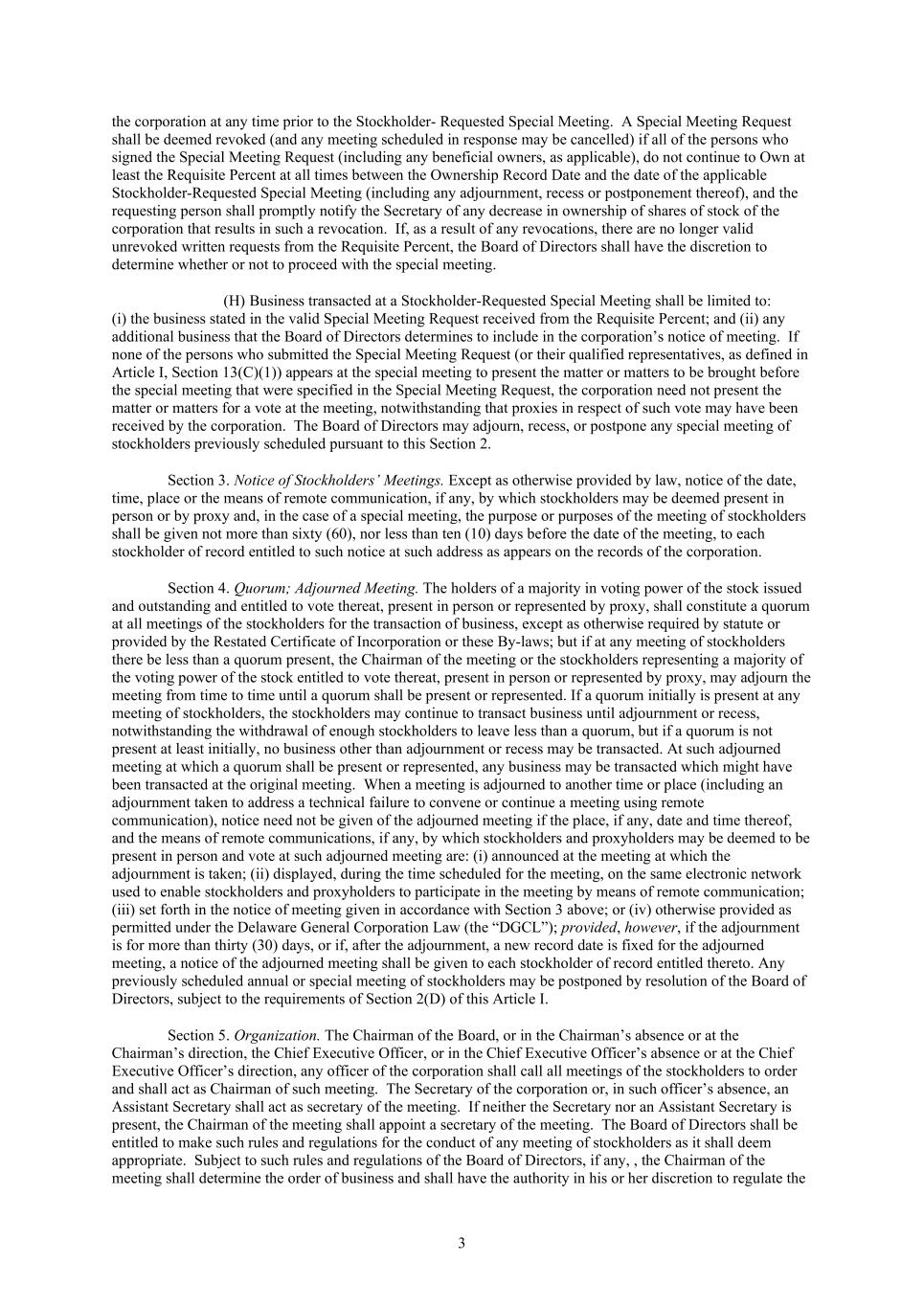
3 the corporation at any time prior to the Stockholder- Requested Special Meeting. A Special Meeting Request shall be deemed revoked (and any meeting scheduled in response may be cancelled) if all of the persons who signed the Special Meeting Request (including any beneficial owners, as applicable), do not continue to Own at least the Requisite Percent at all times between the Ownership Record Date and the date of the applicable Stockholder-Requested Special Meeting (including any adjournment, recess or postponement thereof), and the requesting person shall promptly notify the Secretary of any decrease in ownership of shares of stock of the corporation that results in such a revocation. If, as a result of any revocations, there are no longer valid unrevoked written requests from the Requisite Percent, the Board of Directors shall have the discretion to determine whether or not to proceed with the special meeting. (H) Business transacted at a Stockholder-Requested Special Meeting shall be limited to: (i) the business stated in the valid Special Meeting Request received from the Requisite Percent; and (ii) any additional business that the Board of Directors determines to include in the corporation’s notice of meeting. If none of the persons who submitted the Special Meeting Request (or their qualified representatives, as defined in Article I, Section 13(C)(1)) appears at the special meeting to present the matter or matters to be brought before the special meeting that were specified in the Special Meeting Request, the corporation need not present the matter or matters for a vote at the meeting, notwithstanding that proxies in respect of such vote may have been received by the corporation. The Board of Directors may adjourn, recess, or postpone any special meeting of stockholders previously scheduled pursuant to this Section 2. Section 3. Notice of Stockholders’ Meetings. Except as otherwise provided by law, notice of the date, time, place or the means of remote communication, if any, by which stockholders may be deemed present in person or by proxy and, in the case of a special meeting, the purpose or purposes of the meeting of stockholders shall be given not more than sixty (60), nor less than ten (10) days before the date of the meeting, to each stockholder of record entitled to such notice at such address as appears on the records of the corporation. Section 4. Quorum; Adjourned Meeting. The holders of a majority in voting power of the stock issued and outstanding and entitled to vote thereat, present in person or represented by proxy, shall constitute a quorum at all meetings of the stockholders for the transaction of business, except as otherwise required by statute or provided by the Restated Certificate of Incorporation or these By-laws; but if at any meeting of stockholders there be less than a quorum present, the Chairman of the meeting or the stockholders representing a majority of the voting power of the stock entitled to vote thereat, present in person or represented by proxy, may adjourn the meeting from time to time until a quorum shall be present or represented. If a quorum initially is present at any meeting of stockholders, the stockholders may continue to transact business until adjournment or recess, notwithstanding the withdrawal of enough stockholders to leave less than a quorum, but if a quorum is not present at least initially, no business other than adjournment or recess may be transacted. At such adjourned meeting at which a quorum shall be present or represented, any business may be transacted which might have been transacted at the original meeting. When a meeting is adjourned to another time or place (including an adjournment taken to address a technical failure to convene or continue a meeting using remote communication), notice need not be given of the adjourned meeting if the place, if any, date and time thereof, and the means of remote communications, if any, by which stockholders and proxyholders may be deemed to be present in person and vote at such adjourned meeting are: (i) announced at the meeting at which the adjournment is taken; (ii) displayed, during the time scheduled for the meeting, on the same electronic network used to enable stockholders and proxyholders to participate in the meeting by means of remote communication; (iii) set forth in the notice of meeting given in accordance with Section 3 above; or (iv) otherwise provided as permitted under the Delaware General Corporation Law (the “DGCL”); provided, however, if the adjournment is for more than thirty (30) days, or if, after the adjournment, a new record date is fixed for the adjourned meeting, a notice of the adjourned meeting shall be given to each stockholder of record entitled thereto. Any previously scheduled annual or special meeting of stockholders may be postponed by resolution of the Board of Directors, subject to the requirements of Section 2(D) of this Article I. Section 5. Organization. The Chairman of the Board, or in the Chairman’s absence or at the Chairman’s direction, the Chief Executive Officer, or in the Chief Executive Officer’s absence or at the Chief Executive Officer’s direction, any officer of the corporation shall call all meetings of the stockholders to order and shall act as Chairman of such meeting. The Secretary of the corporation or, in such officer’s absence, an Assistant Secretary shall act as secretary of the meeting. If neither the Secretary nor an Assistant Secretary is present, the Chairman of the meeting shall appoint a secretary of the meeting. The Board of Directors shall be entitled to make such rules and regulations for the conduct of any meeting of stockholders as it shall deem appropriate. Subject to such rules and regulations of the Board of Directors, if any, , the Chairman of the meeting shall determine the order of business and shall have the authority in his or her discretion to regulate the
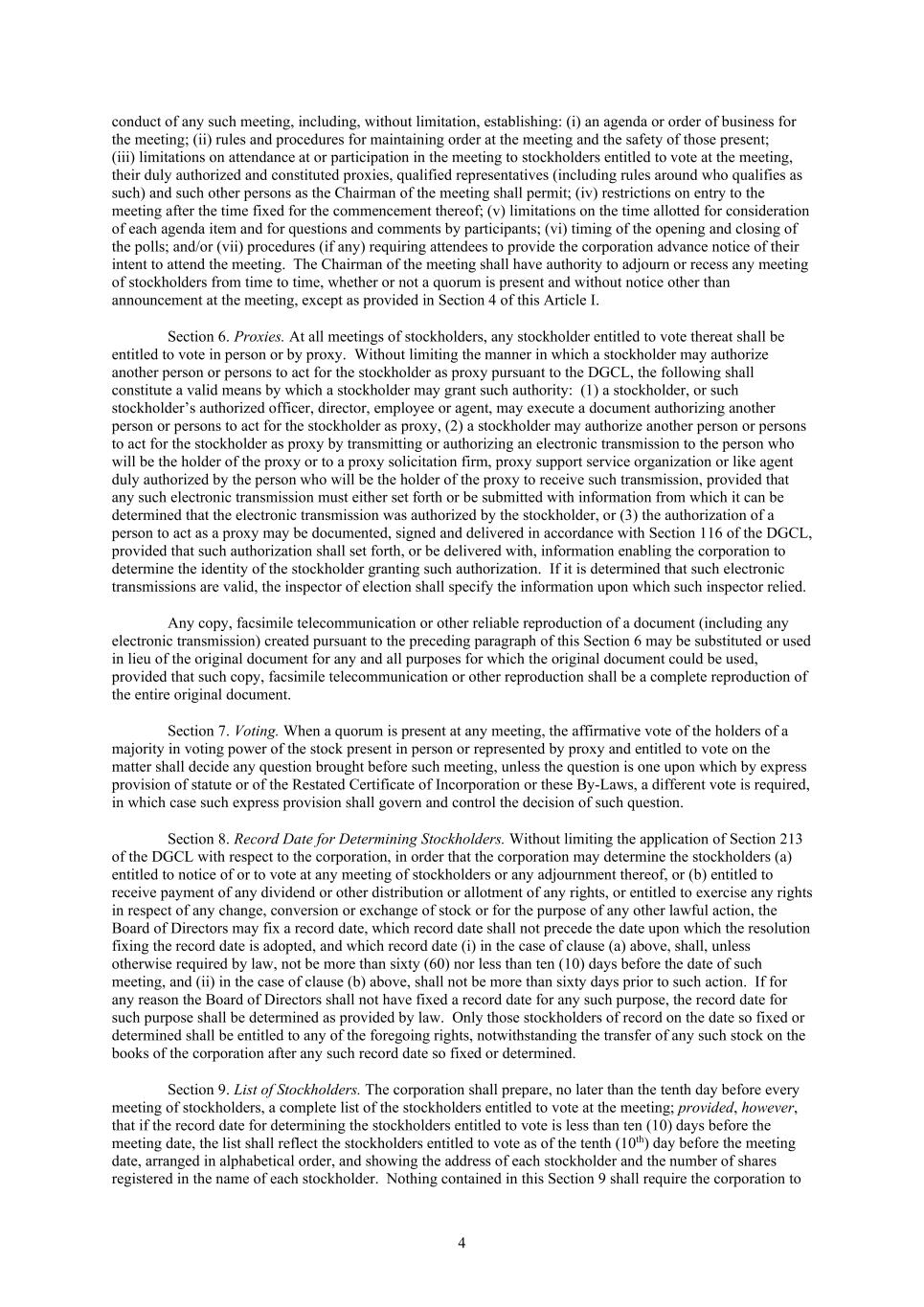
4 conduct of any such meeting, including, without limitation, establishing: (i) an agenda or order of business for the meeting; (ii) rules and procedures for maintaining order at the meeting and the safety of those present; (iii) limitations on attendance at or participation in the meeting to stockholders entitled to vote at the meeting, their duly authorized and constituted proxies, qualified representatives (including rules around who qualifies as such) and such other persons as the Chairman of the meeting shall permit; (iv) restrictions on entry to the meeting after the time fixed for the commencement thereof; (v) limitations on the time allotted for consideration of each agenda item and for questions and comments by participants; (vi) timing of the opening and closing of the polls; and/or (vii) procedures (if any) requiring attendees to provide the corporation advance notice of their intent to attend the meeting. The Chairman of the meeting shall have authority to adjourn or recess any meeting of stockholders from time to time, whether or not a quorum is present and without notice other than announcement at the meeting, except as provided in Section 4 of this Article I. Section 6. Proxies. At all meetings of stockholders, any stockholder entitled to vote thereat shall be entitled to vote in person or by proxy. Without limiting the manner in which a stockholder may authorize another person or persons to act for the stockholder as proxy pursuant to the DGCL, the following shall constitute a valid means by which a stockholder may grant such authority: (1) a stockholder, or such stockholder’s authorized officer, director, employee or agent, may execute a document authorizing another person or persons to act for the stockholder as proxy, (2) a stockholder may authorize another person or persons to act for the stockholder as proxy by transmitting or authorizing an electronic transmission to the person who will be the holder of the proxy or to a proxy solicitation firm, proxy support service organization or like agent duly authorized by the person who will be the holder of the proxy to receive such transmission, provided that any such electronic transmission must either set forth or be submitted with information from which it can be determined that the electronic transmission was authorized by the stockholder, or (3) the authorization of a person to act as a proxy may be documented, signed and delivered in accordance with Section 116 of the DGCL, provided that such authorization shall set forth, or be delivered with, information enabling the corporation to determine the identity of the stockholder granting such authorization. If it is determined that such electronic transmissions are valid, the inspector of election shall specify the information upon which such inspector relied. Any copy, facsimile telecommunication or other reliable reproduction of a document (including any electronic transmission) created pursuant to the preceding paragraph of this Section 6 may be substituted or used in lieu of the original document for any and all purposes for which the original document could be used, provided that such copy, facsimile telecommunication or other reproduction shall be a complete reproduction of the entire original document. Section 7. Voting. When a quorum is present at any meeting, the affirmative vote of the holders of a majority in voting power of the stock present in person or represented by proxy and entitled to vote on the matter shall decide any question brought before such meeting, unless the question is one upon which by express provision of statute or of the Restated Certificate of Incorporation or these By-Laws, a different vote is required, in which case such express provision shall govern and control the decision of such question. Section 8. Record Date for Determining Stockholders. Without limiting the application of Section 213 of the DGCL with respect to the corporation, in order that the corporation may determine the stockholders (a) entitled to notice of or to vote at any meeting of stockholders or any adjournment thereof, or (b) entitled to receive payment of any dividend or other distribution or allotment of any rights, or entitled to exercise any rights in respect of any change, conversion or exchange of stock or for the purpose of any other lawful action, the Board of Directors may fix a record date, which record date shall not precede the date upon which the resolution fixing the record date is adopted, and which record date (i) in the case of clause (a) above, shall, unless otherwise required by law, not be more than sixty (60) nor less than ten (10) days before the date of such meeting, and (ii) in the case of clause (b) above, shall not be more than sixty days prior to such action. If for any reason the Board of Directors shall not have fixed a record date for any such purpose, the record date for such purpose shall be determined as provided by law. Only those stockholders of record on the date so fixed or determined shall be entitled to any of the foregoing rights, notwithstanding the transfer of any such stock on the books of the corporation after any such record date so fixed or determined. Section 9. List of Stockholders. The corporation shall prepare, no later than the tenth day before every meeting of stockholders, a complete list of the stockholders entitled to vote at the meeting; provided, however, that if the record date for determining the stockholders entitled to vote is less than ten (10) days before the meeting date, the list shall reflect the stockholders entitled to vote as of the tenth (10th) day before the meeting date, arranged in alphabetical order, and showing the address of each stockholder and the number of shares registered in the name of each stockholder. Nothing contained in this Section 9 shall require the corporation to
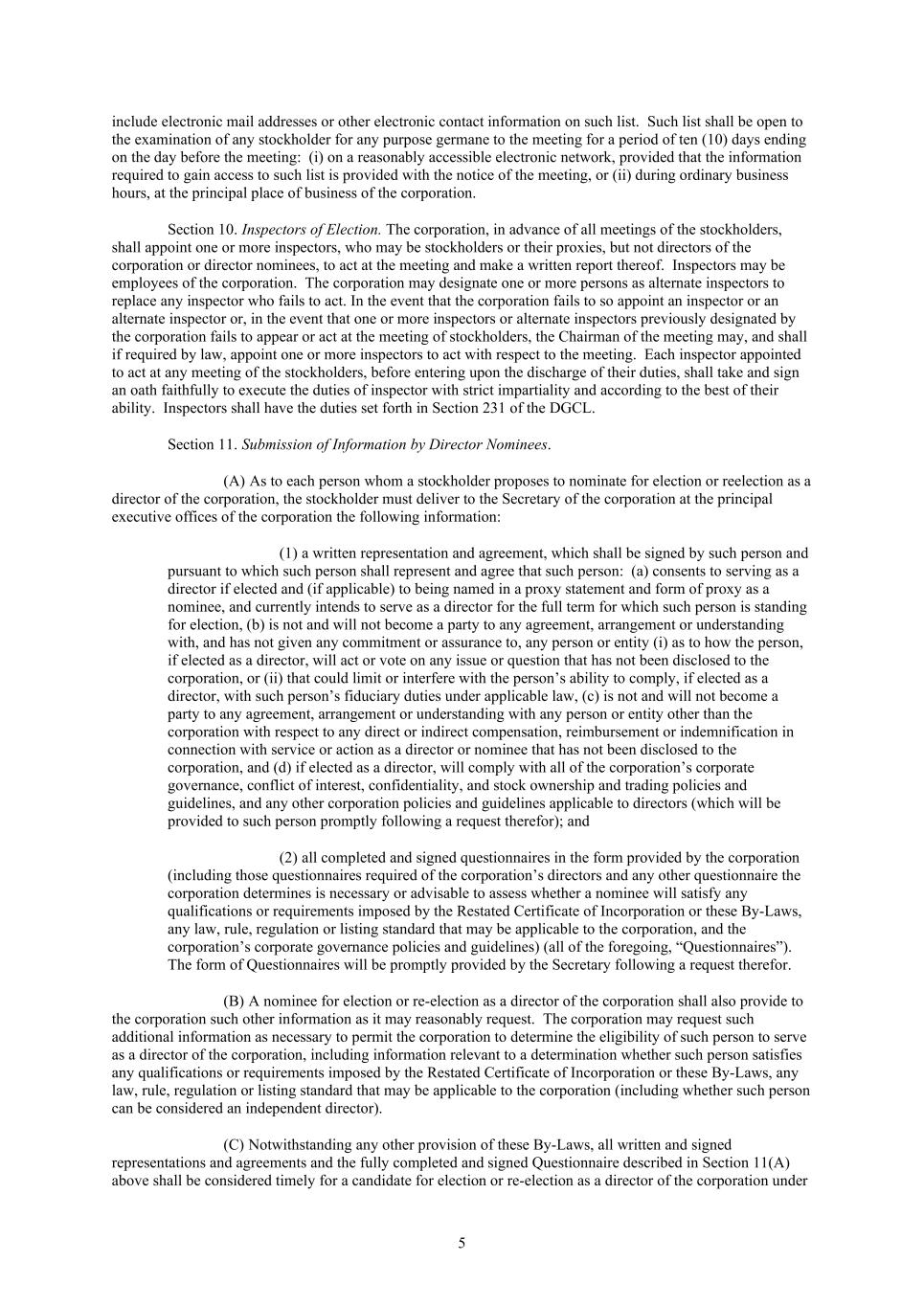
5 include electronic mail addresses or other electronic contact information on such list. Such list shall be open to the examination of any stockholder for any purpose germane to the meeting for a period of ten (10) days ending on the day before the meeting: (i) on a reasonably accessible electronic network, provided that the information required to gain access to such list is provided with the notice of the meeting, or (ii) during ordinary business hours, at the principal place of business of the corporation. Section 10. Inspectors of Election. The corporation, in advance of all meetings of the stockholders, shall appoint one or more inspectors, who may be stockholders or their proxies, but not directors of the corporation or director nominees, to act at the meeting and make a written report thereof. Inspectors may be employees of the corporation. The corporation may designate one or more persons as alternate inspectors to replace any inspector who fails to act. In the event that the corporation fails to so appoint an inspector or an alternate inspector or, in the event that one or more inspectors or alternate inspectors previously designated by the corporation fails to appear or act at the meeting of stockholders, the Chairman of the meeting may, and shall if required by law, appoint one or more inspectors to act with respect to the meeting. Each inspector appointed to act at any meeting of the stockholders, before entering upon the discharge of their duties, shall take and sign an oath faithfully to execute the duties of inspector with strict impartiality and according to the best of their ability. Inspectors shall have the duties set forth in Section 231 of the DGCL. Section 11. Submission of Information by Director Nominees. (A) As to each person whom a stockholder proposes to nominate for election or reelection as a director of the corporation, the stockholder must deliver to the Secretary of the corporation at the principal executive offices of the corporation the following information: (1) a written representation and agreement, which shall be signed by such person and pursuant to which such person shall represent and agree that such person: (a) consents to serving as a director if elected and (if applicable) to being named in a proxy statement and form of proxy as a nominee, and currently intends to serve as a director for the full term for which such person is standing for election, (b) is not and will not become a party to any agreement, arrangement or understanding with, and has not given any commitment or assurance to, any person or entity (i) as to how the person, if elected as a director, will act or vote on any issue or question that has not been disclosed to the corporation, or (ii) that could limit or interfere with the person’s ability to comply, if elected as a director, with such person’s fiduciary duties under applicable law, (c) is not and will not become a party to any agreement, arrangement or understanding with any person or entity other than the corporation with respect to any direct or indirect compensation, reimbursement or indemnification in connection with service or action as a director or nominee that has not been disclosed to the corporation, and (d) if elected as a director, will comply with all of the corporation’s corporate governance, conflict of interest, confidentiality, and stock ownership and trading policies and guidelines, and any other corporation policies and guidelines applicable to directors (which will be provided to such person promptly following a request therefor); and (2) all completed and signed questionnaires in the form provided by the corporation (including those questionnaires required of the corporation’s directors and any other questionnaire the corporation determines is necessary or advisable to assess whether a nominee will satisfy any qualifications or requirements imposed by the Restated Certificate of Incorporation or these By-Laws, any law, rule, regulation or listing standard that may be applicable to the corporation, and the corporation’s corporate governance policies and guidelines) (all of the foregoing, “Questionnaires”). The form of Questionnaires will be promptly provided by the Secretary following a request therefor. (B) A nominee for election or re-election as a director of the corporation shall also provide to the corporation such other information as it may reasonably request. The corporation may request such additional information as necessary to permit the corporation to determine the eligibility of such person to serve as a director of the corporation, including information relevant to a determination whether such person satisfies any qualifications or requirements imposed by the Restated Certificate of Incorporation or these By-Laws, any law, rule, regulation or listing standard that may be applicable to the corporation (including whether such person can be considered an independent director). (C) Notwithstanding any other provision of these By-Laws, all written and signed representations and agreements and the fully completed and signed Questionnaire described in Section 11(A) above shall be considered timely for a candidate for election or re-election as a director of the corporation under

6 Article I, Section 2, Section 12 or Section 13 if provided to the corporation in accordance with the time period for delivery of the stockholder notice pursuant to Section 2(D), Section 12(A)(2) or Section 12(B), or the time periods specified in Section 13(C)(3), whichever is applicable, and the additional information described in Section 11(B) above shall be provided to the corporation promptly upon request by the Corporation, but in any event within five (5) business days after such request (or by the day prior to the day of the annual meeting, if earlier). All information provided pursuant to this Section 11 shall be deemed part of the Special Meeting Request submitted pursuant to Section 2, the stockholder’s notice submitted pursuant to such Section 12 or a Stockholder Notice submitted pursuant to such Section 13, as applicable. Section 12. Notice of Stockholder Business and Nominations. (A) Annual Meetings of Stockholders. (1) Nominations of persons for election to the Board of Directors of the corporation and the proposal of business other than nominations to be considered by the stockholders may be made at an annual meeting of stockholders only: (a) pursuant to the corporation’s notice of meeting (or any supplement thereto), (b) by or at the direction of the Board of Directors (or any authorized committee thereof) or the Chairman of the Board, (c) by any stockholder of the corporation who is a stockholder of record at the time the notice provided for in this Section 12(A) is delivered to the Secretary of the corporation, who is entitled to vote at the meeting and who complies with the notice procedures set forth in this Section 12(A), or (d) by any Eligible Stockholder (as defined in Article I, Section 13) whose Stockholder Nominee (as defined in Article I, Section 13) is included in the corporation’s proxy materials for the relevant annual meeting. For the avoidance of doubt, the foregoing clauses (c) and (d) shall be the exclusive means for a stockholder to make director nominations at an annual meeting of stockholders, and the foregoing clause (c) shall be the exclusive means for a stockholder to propose other business at an annual meeting of stockholders (other than a proposal included in the corporation’s proxy statement pursuant to and in compliance with Rule 14a-8 under the Securities Exchange Act of 1934, as amended (the “Exchange Act”)). (2) For nominations or other business to be properly brought before an annual meeting by a stockholder pursuant to clause (c) of paragraph (A)(1) of this By-Law, the stockholder must have given timely notice thereof in writing to the Secretary of the corporation, and, in the case of business other than nominations, such business must be a proper subject for stockholder action under Delaware law. To be timely, a stockholder’s notice must be delivered to the Secretary at the principal executive offices of the corporation, by hand or by certified or registered delivery, with delivery signature confirmation, not later than the close of business (as defined in Section 12(C)(2) below) on the ninetieth (90th) day nor earlier than the close of business on the one hundred and twentieth (120th) day prior to the first anniversary of the preceding year’s annual meeting; provided, however, that in the event that the date of the annual meeting is more than thirty (30) days before or more than thirty (30) days after such anniversary date, or if no annual meeting was held in the preceding year, notice by the stockholder to be timely must be so delivered not earlier than the close of business on the one hundred and twentieth (120th) day prior to such annual meeting and not later than the close of business on the later of the ninetieth (90th) day prior to such annual meeting or the tenth (10th) day following the date on which public announcement (as defined in Section 12(C)(2) below) of the date of such meeting is first made by the corporation. In no event shall an adjournment or recess of an annual meeting, or a postponement of an annual meeting for which notice of the meeting has already been given to stockholders or a public announcement of the meeting date has already been made, commence a new time period (or extend any time period) for the giving of a stockholder’s notice as described above. A stockholder’s notice given in accordance with this Section 12(A)(2) with respect to nominations must contain the names of only the nominees for whom the Proposing Stockholder (as defined in Section 12(A)(2)(d) below) intends to solicit proxies, and a stockholder shall not be entitled to make additional or substitute nominations following the expiration of the time periods set forth in this Section 12(A)(2). The number of nominees a stockholder may nominate for election at the annual meeting (or in the case of a stockholder giving the notice on behalf of a beneficial owner, the number of nominees a stockholder may nominate for election at the annual meeting on behalf of the beneficial owner) shall not exceed the number of directors to be elected at such annual meeting. Such stockholder’s notice shall set forth: (a) as to each person whom the stockholder proposes to nominate for election or re-election as a director: (i) all information relating to such person that is required
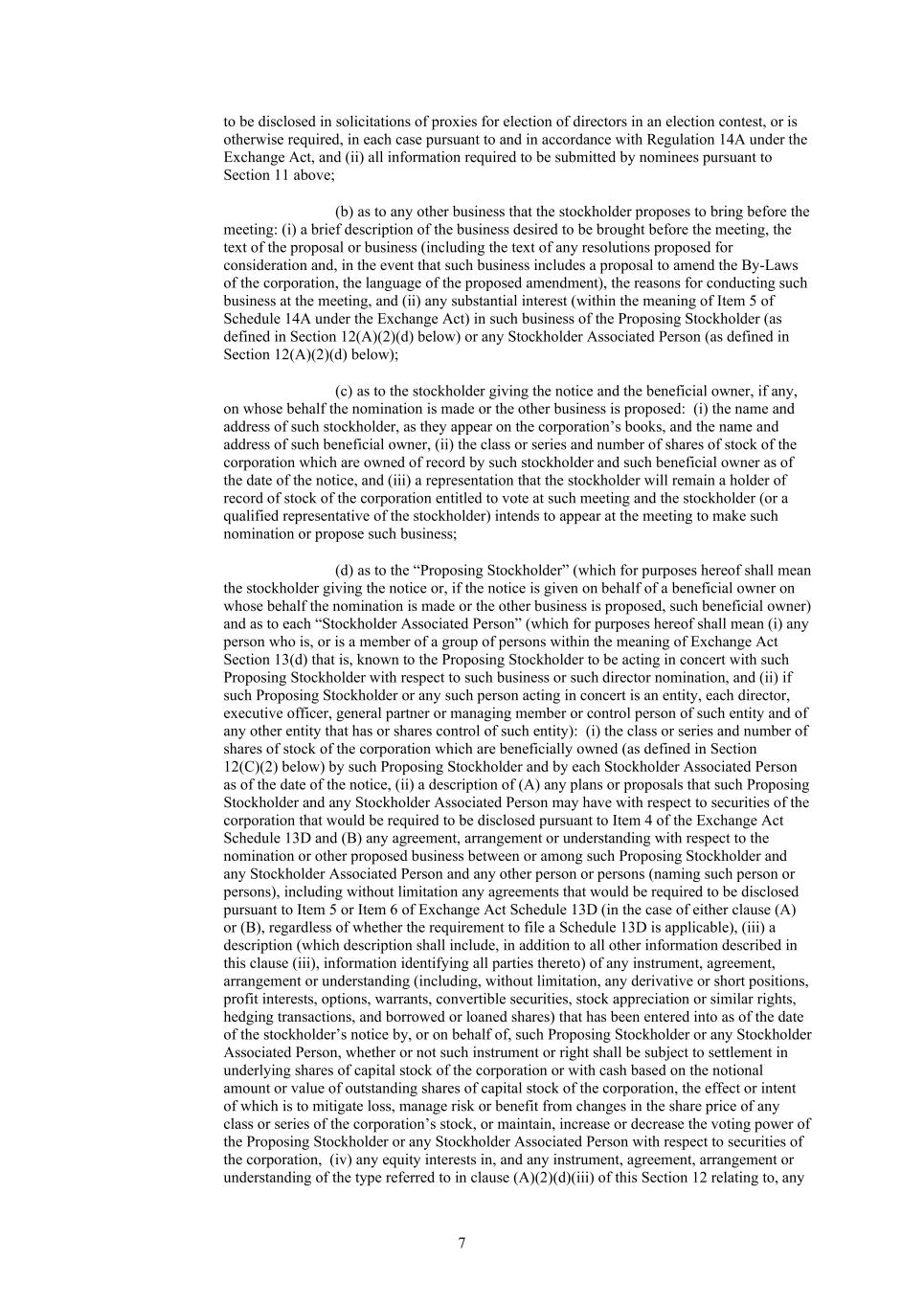
7 to be disclosed in solicitations of proxies for election of directors in an election contest, or is otherwise required, in each case pursuant to and in accordance with Regulation 14A under the Exchange Act, and (ii) all information required to be submitted by nominees pursuant to Section 11 above; (b) as to any other business that the stockholder proposes to bring before the meeting: (i) a brief description of the business desired to be brought before the meeting, the text of the proposal or business (including the text of any resolutions proposed for consideration and, in the event that such business includes a proposal to amend the By-Laws of the corporation, the language of the proposed amendment), the reasons for conducting such business at the meeting, and (ii) any substantial interest (within the meaning of Item 5 of Schedule 14A under the Exchange Act) in such business of the Proposing Stockholder (as defined in Section 12(A)(2)(d) below) or any Stockholder Associated Person (as defined in Section 12(A)(2)(d) below); (c) as to the stockholder giving the notice and the beneficial owner, if any, on whose behalf the nomination is made or the other business is proposed: (i) the name and address of such stockholder, as they appear on the corporation’s books, and the name and address of such beneficial owner, (ii) the class or series and number of shares of stock of the corporation which are owned of record by such stockholder and such beneficial owner as of the date of the notice, and (iii) a representation that the stockholder will remain a holder of record of stock of the corporation entitled to vote at such meeting and the stockholder (or a qualified representative of the stockholder) intends to appear at the meeting to make such nomination or propose such business; (d) as to the “Proposing Stockholder” (which for purposes hereof shall mean the stockholder giving the notice or, if the notice is given on behalf of a beneficial owner on whose behalf the nomination is made or the other business is proposed, such beneficial owner) and as to each “Stockholder Associated Person” (which for purposes hereof shall mean (i) any person who is, or is a member of a group of persons within the meaning of Exchange Act Section 13(d) that is, known to the Proposing Stockholder to be acting in concert with such Proposing Stockholder with respect to such business or such director nomination, and (ii) if such Proposing Stockholder or any such person acting in concert is an entity, each director, executive officer, general partner or managing member or control person of such entity and of any other entity that has or shares control of such entity): (i) the class or series and number of shares of stock of the corporation which are beneficially owned (as defined in Section 12(C)(2) below) by such Proposing Stockholder and by each Stockholder Associated Person as of the date of the notice, (ii) a description of (A) any plans or proposals that such Proposing Stockholder and any Stockholder Associated Person may have with respect to securities of the corporation that would be required to be disclosed pursuant to Item 4 of the Exchange Act Schedule 13D and (B) any agreement, arrangement or understanding with respect to the nomination or other proposed business between or among such Proposing Stockholder and any Stockholder Associated Person and any other person or persons (naming such person or persons), including without limitation any agreements that would be required to be disclosed pursuant to Item 5 or Item 6 of Exchange Act Schedule 13D (in the case of either clause (A) or (B), regardless of whether the requirement to file a Schedule 13D is applicable), (iii) a description (which description shall include, in addition to all other information described in this clause (iii), information identifying all parties thereto) of any instrument, agreement, arrangement or understanding (including, without limitation, any derivative or short positions, profit interests, options, warrants, convertible securities, stock appreciation or similar rights, hedging transactions, and borrowed or loaned shares) that has been entered into as of the date of the stockholder’s notice by, or on behalf of, such Proposing Stockholder or any Stockholder Associated Person, whether or not such instrument or right shall be subject to settlement in underlying shares of capital stock of the corporation or with cash based on the notional amount or value of outstanding shares of capital stock of the corporation, the effect or intent of which is to mitigate loss, manage risk or benefit from changes in the share price of any class or series of the corporation’s stock, or maintain, increase or decrease the voting power of the Proposing Stockholder or any Stockholder Associated Person with respect to securities of the corporation, (iv) any equity interests in, and any instrument, agreement, arrangement or understanding of the type referred to in clause (A)(2)(d)(iii) of this Section 12 relating to, any
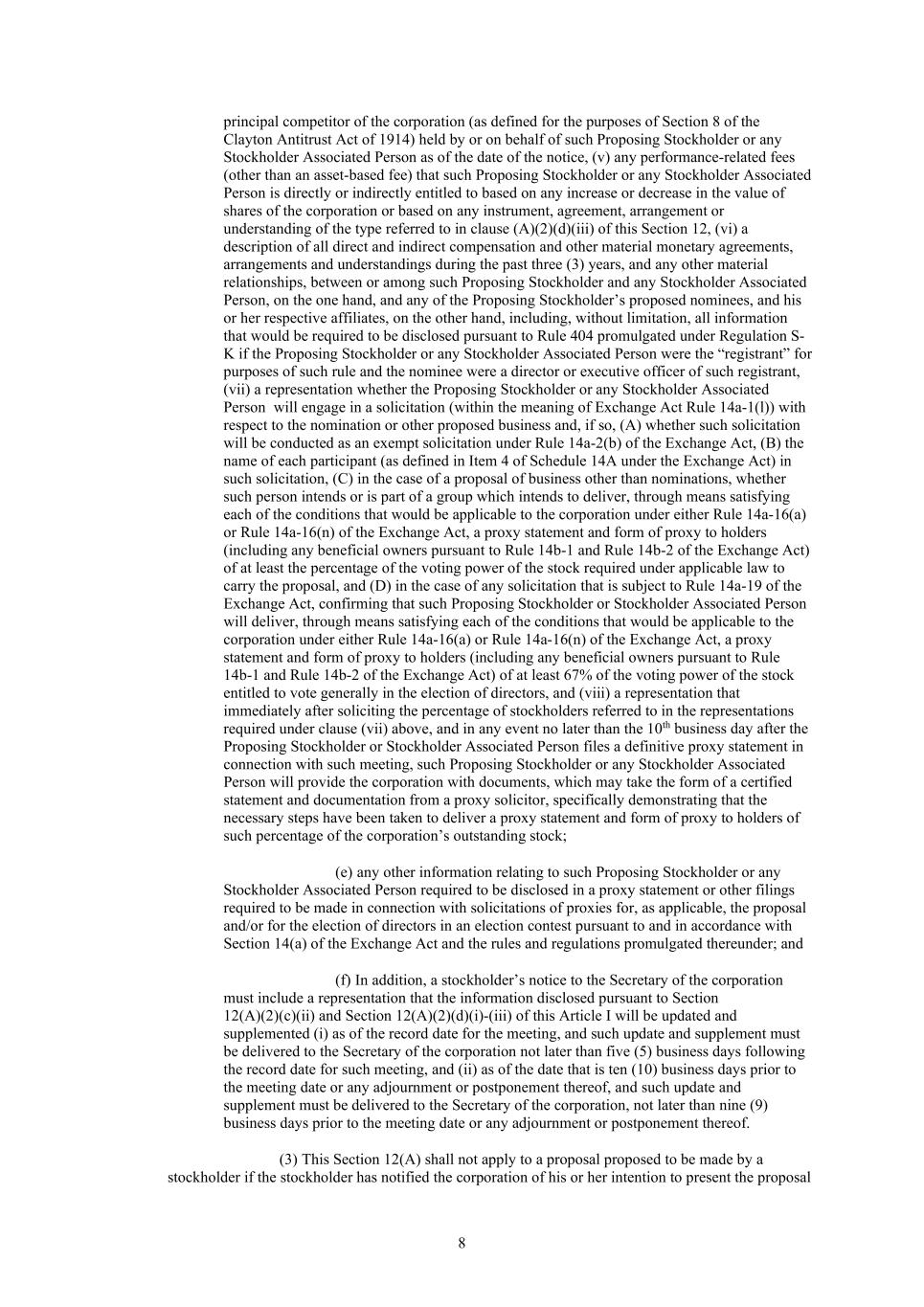
8 principal competitor of the corporation (as defined for the purposes of Section 8 of the Clayton Antitrust Act of 1914) held by or on behalf of such Proposing Stockholder or any Stockholder Associated Person as of the date of the notice, (v) any performance-related fees (other than an asset-based fee) that such Proposing Stockholder or any Stockholder Associated Person is directly or indirectly entitled to based on any increase or decrease in the value of shares of the corporation or based on any instrument, agreement, arrangement or understanding of the type referred to in clause (A)(2)(d)(iii) of this Section 12, (vi) a description of all direct and indirect compensation and other material monetary agreements, arrangements and understandings during the past three (3) years, and any other material relationships, between or among such Proposing Stockholder and any Stockholder Associated Person, on the one hand, and any of the Proposing Stockholder’s proposed nominees, and his or her respective affiliates, on the other hand, including, without limitation, all information that would be required to be disclosed pursuant to Rule 404 promulgated under Regulation S‐ K if the Proposing Stockholder or any Stockholder Associated Person were the “registrant” for purposes of such rule and the nominee were a director or executive officer of such registrant, (vii) a representation whether the Proposing Stockholder or any Stockholder Associated Person will engage in a solicitation (within the meaning of Exchange Act Rule 14a-1(l)) with respect to the nomination or other proposed business and, if so, (A) whether such solicitation will be conducted as an exempt solicitation under Rule 14a-2(b) of the Exchange Act, (B) the name of each participant (as defined in Item 4 of Schedule 14A under the Exchange Act) in such solicitation, (C) in the case of a proposal of business other than nominations, whether such person intends or is part of a group which intends to deliver, through means satisfying each of the conditions that would be applicable to the corporation under either Rule 14a-16(a) or Rule 14a-16(n) of the Exchange Act, a proxy statement and form of proxy to holders (including any beneficial owners pursuant to Rule 14b-1 and Rule 14b-2 of the Exchange Act) of at least the percentage of the voting power of the stock required under applicable law to carry the proposal, and (D) in the case of any solicitation that is subject to Rule 14a-19 of the Exchange Act, confirming that such Proposing Stockholder or Stockholder Associated Person will deliver, through means satisfying each of the conditions that would be applicable to the corporation under either Rule 14a-16(a) or Rule 14a-16(n) of the Exchange Act, a proxy statement and form of proxy to holders (including any beneficial owners pursuant to Rule 14b-1 and Rule 14b-2 of the Exchange Act) of at least 67% of the voting power of the stock entitled to vote generally in the election of directors, and (viii) a representation that immediately after soliciting the percentage of stockholders referred to in the representations required under clause (vii) above, and in any event no later than the 10th business day after the Proposing Stockholder or Stockholder Associated Person files a definitive proxy statement in connection with such meeting, such Proposing Stockholder or any Stockholder Associated Person will provide the corporation with documents, which may take the form of a certified statement and documentation from a proxy solicitor, specifically demonstrating that the necessary steps have been taken to deliver a proxy statement and form of proxy to holders of such percentage of the corporation’s outstanding stock; (e) any other information relating to such Proposing Stockholder or any Stockholder Associated Person required to be disclosed in a proxy statement or other filings required to be made in connection with solicitations of proxies for, as applicable, the proposal and/or for the election of directors in an election contest pursuant to and in accordance with Section 14(a) of the Exchange Act and the rules and regulations promulgated thereunder; and (f) In addition, a stockholder’s notice to the Secretary of the corporation must include a representation that the information disclosed pursuant to Section 12(A)(2)(c)(ii) and Section 12(A)(2)(d)(i)-(iii) of this Article I will be updated and supplemented (i) as of the record date for the meeting, and such update and supplement must be delivered to the Secretary of the corporation not later than five (5) business days following the record date for such meeting, and (ii) as of the date that is ten (10) business days prior to the meeting date or any adjournment or postponement thereof, and such update and supplement must be delivered to the Secretary of the corporation, not later than nine (9) business days prior to the meeting date or any adjournment or postponement thereof. (3) This Section 12(A) shall not apply to a proposal proposed to be made by a stockholder if the stockholder has notified the corporation of his or her intention to present the proposal
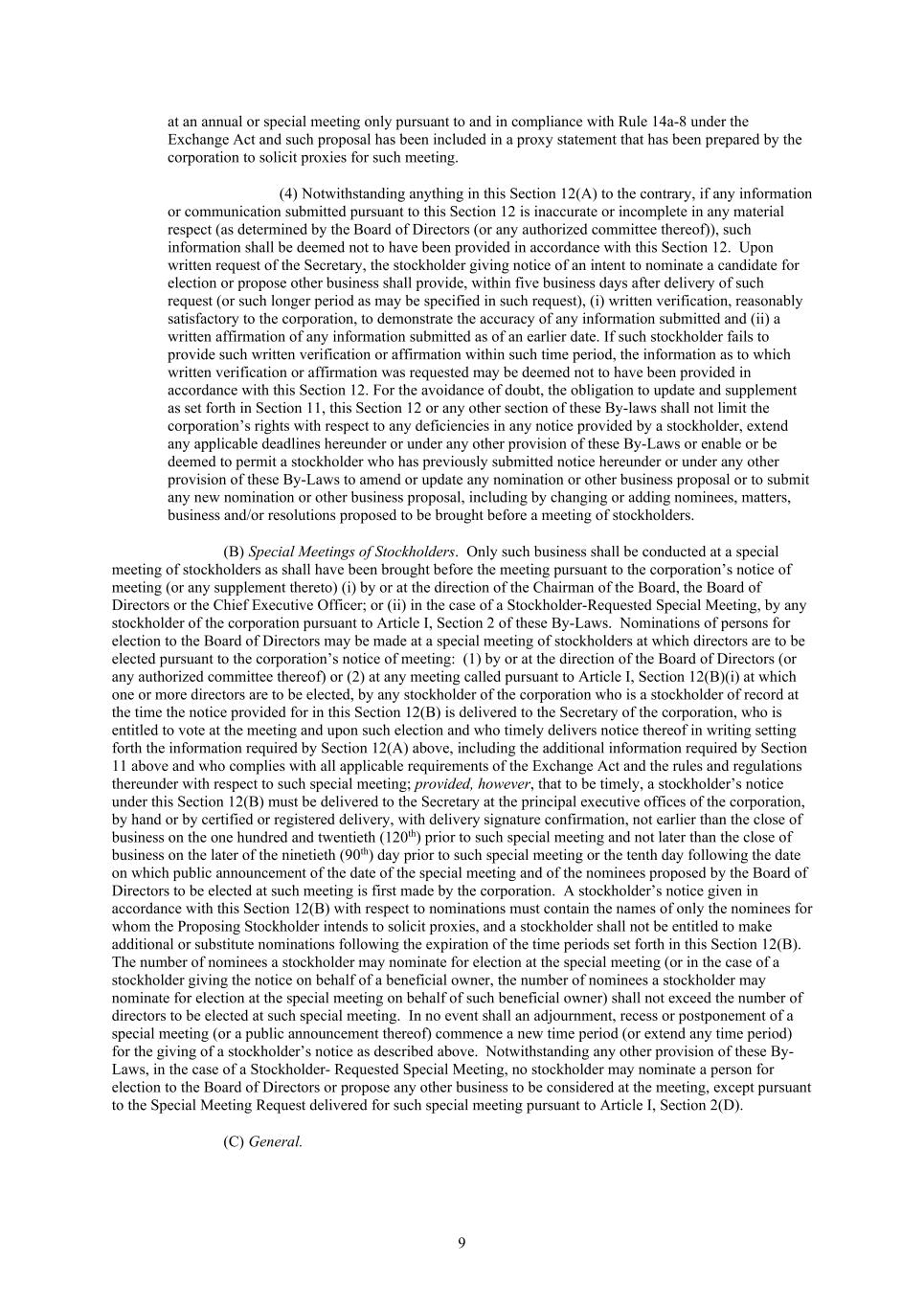
9 at an annual or special meeting only pursuant to and in compliance with Rule 14a-8 under the Exchange Act and such proposal has been included in a proxy statement that has been prepared by the corporation to solicit proxies for such meeting. (4) Notwithstanding anything in this Section 12(A) to the contrary, if any information or communication submitted pursuant to this Section 12 is inaccurate or incomplete in any material respect (as determined by the Board of Directors (or any authorized committee thereof)), such information shall be deemed not to have been provided in accordance with this Section 12. Upon written request of the Secretary, the stockholder giving notice of an intent to nominate a candidate for election or propose other business shall provide, within five business days after delivery of such request (or such longer period as may be specified in such request), (i) written verification, reasonably satisfactory to the corporation, to demonstrate the accuracy of any information submitted and (ii) a written affirmation of any information submitted as of an earlier date. If such stockholder fails to provide such written verification or affirmation within such time period, the information as to which written verification or affirmation was requested may be deemed not to have been provided in accordance with this Section 12. For the avoidance of doubt, the obligation to update and supplement as set forth in Section 11, this Section 12 or any other section of these By-laws shall not limit the corporation’s rights with respect to any deficiencies in any notice provided by a stockholder, extend any applicable deadlines hereunder or under any other provision of these By-Laws or enable or be deemed to permit a stockholder who has previously submitted notice hereunder or under any other provision of these By-Laws to amend or update any nomination or other business proposal or to submit any new nomination or other business proposal, including by changing or adding nominees, matters, business and/or resolutions proposed to be brought before a meeting of stockholders. (B) Special Meetings of Stockholders. Only such business shall be conducted at a special meeting of stockholders as shall have been brought before the meeting pursuant to the corporation’s notice of meeting (or any supplement thereto) (i) by or at the direction of the Chairman of the Board, the Board of Directors or the Chief Executive Officer; or (ii) in the case of a Stockholder-Requested Special Meeting, by any stockholder of the corporation pursuant to Article I, Section 2 of these By-Laws. Nominations of persons for election to the Board of Directors may be made at a special meeting of stockholders at which directors are to be elected pursuant to the corporation’s notice of meeting: (1) by or at the direction of the Board of Directors (or any authorized committee thereof) or (2) at any meeting called pursuant to Article I, Section 12(B)(i) at which one or more directors are to be elected, by any stockholder of the corporation who is a stockholder of record at the time the notice provided for in this Section 12(B) is delivered to the Secretary of the corporation, who is entitled to vote at the meeting and upon such election and who timely delivers notice thereof in writing setting forth the information required by Section 12(A) above, including the additional information required by Section 11 above and who complies with all applicable requirements of the Exchange Act and the rules and regulations thereunder with respect to such special meeting; provided, however, that to be timely, a stockholder’s notice under this Section 12(B) must be delivered to the Secretary at the principal executive offices of the corporation, by hand or by certified or registered delivery, with delivery signature confirmation, not earlier than the close of business on the one hundred and twentieth (120th) prior to such special meeting and not later than the close of business on the later of the ninetieth (90th) day prior to such special meeting or the tenth day following the date on which public announcement of the date of the special meeting and of the nominees proposed by the Board of Directors to be elected at such meeting is first made by the corporation. A stockholder’s notice given in accordance with this Section 12(B) with respect to nominations must contain the names of only the nominees for whom the Proposing Stockholder intends to solicit proxies, and a stockholder shall not be entitled to make additional or substitute nominations following the expiration of the time periods set forth in this Section 12(B). The number of nominees a stockholder may nominate for election at the special meeting (or in the case of a stockholder giving the notice on behalf of a beneficial owner, the number of nominees a stockholder may nominate for election at the special meeting on behalf of such beneficial owner) shall not exceed the number of directors to be elected at such special meeting. In no event shall an adjournment, recess or postponement of a special meeting (or a public announcement thereof) commence a new time period (or extend any time period) for the giving of a stockholder’s notice as described above. Notwithstanding any other provision of these By- Laws, in the case of a Stockholder- Requested Special Meeting, no stockholder may nominate a person for election to the Board of Directors or propose any other business to be considered at the meeting, except pursuant to the Special Meeting Request delivered for such special meeting pursuant to Article I, Section 2(D). (C) General.
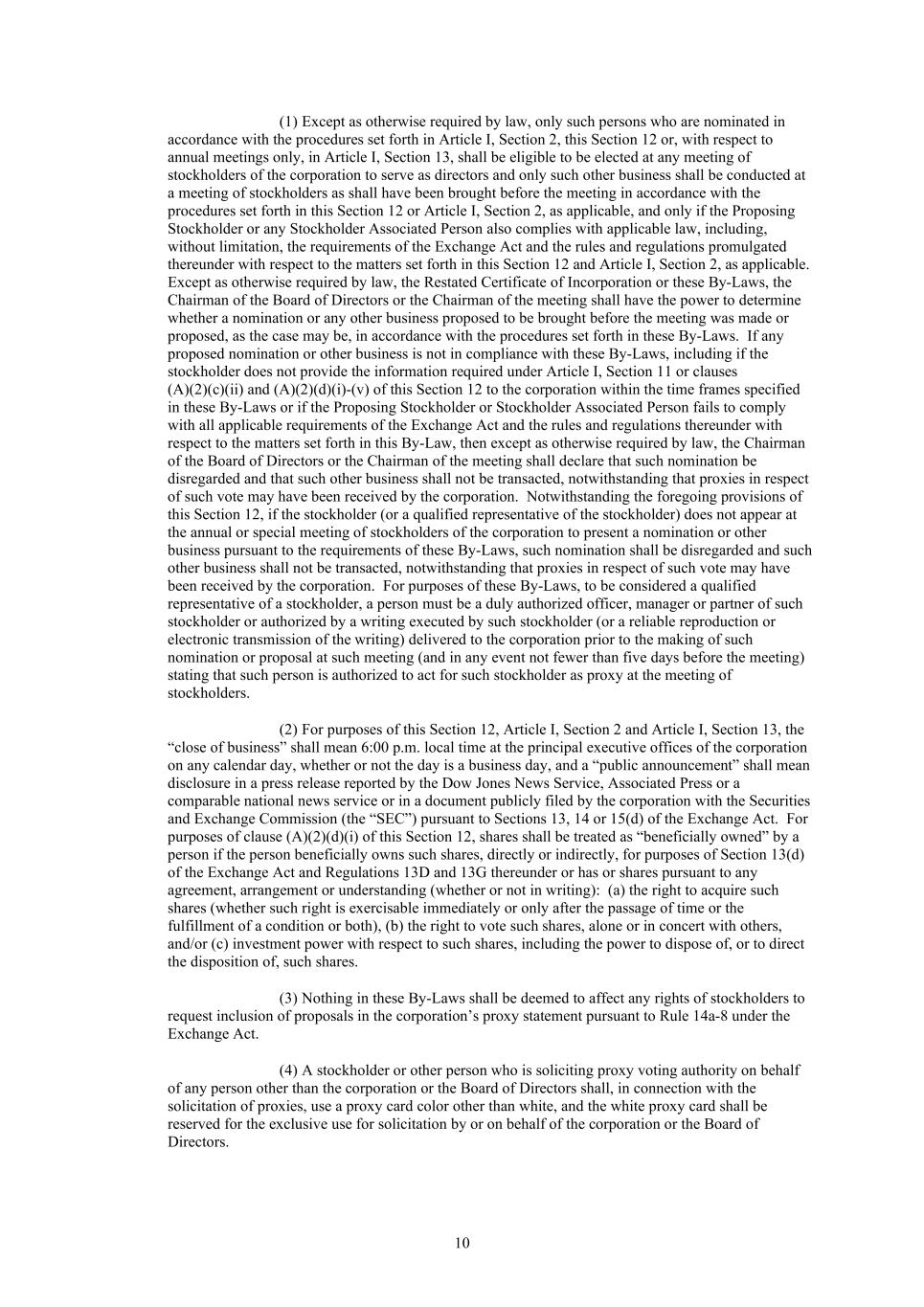
10 (1) Except as otherwise required by law, only such persons who are nominated in accordance with the procedures set forth in Article I, Section 2, this Section 12 or, with respect to annual meetings only, in Article I, Section 13, shall be eligible to be elected at any meeting of stockholders of the corporation to serve as directors and only such other business shall be conducted at a meeting of stockholders as shall have been brought before the meeting in accordance with the procedures set forth in this Section 12 or Article I, Section 2, as applicable, and only if the Proposing Stockholder or any Stockholder Associated Person also complies with applicable law, including, without limitation, the requirements of the Exchange Act and the rules and regulations promulgated thereunder with respect to the matters set forth in this Section 12 and Article I, Section 2, as applicable. Except as otherwise required by law, the Restated Certificate of Incorporation or these By-Laws, the Chairman of the Board of Directors or the Chairman of the meeting shall have the power to determine whether a nomination or any other business proposed to be brought before the meeting was made or proposed, as the case may be, in accordance with the procedures set forth in these By-Laws. If any proposed nomination or other business is not in compliance with these By-Laws, including if the stockholder does not provide the information required under Article I, Section 11 or clauses (A)(2)(c)(ii) and (A)(2)(d)(i)-(v) of this Section 12 to the corporation within the time frames specified in these By-Laws or if the Proposing Stockholder or Stockholder Associated Person fails to comply with all applicable requirements of the Exchange Act and the rules and regulations thereunder with respect to the matters set forth in this By-Law, then except as otherwise required by law, the Chairman of the Board of Directors or the Chairman of the meeting shall declare that such nomination be disregarded and that such other business shall not be transacted, notwithstanding that proxies in respect of such vote may have been received by the corporation. Notwithstanding the foregoing provisions of this Section 12, if the stockholder (or a qualified representative of the stockholder) does not appear at the annual or special meeting of stockholders of the corporation to present a nomination or other business pursuant to the requirements of these By-Laws, such nomination shall be disregarded and such other business shall not be transacted, notwithstanding that proxies in respect of such vote may have been received by the corporation. For purposes of these By-Laws, to be considered a qualified representative of a stockholder, a person must be a duly authorized officer, manager or partner of such stockholder or authorized by a writing executed by such stockholder (or a reliable reproduction or electronic transmission of the writing) delivered to the corporation prior to the making of such nomination or proposal at such meeting (and in any event not fewer than five days before the meeting) stating that such person is authorized to act for such stockholder as proxy at the meeting of stockholders. (2) For purposes of this Section 12, Article I, Section 2 and Article I, Section 13, the “close of business” shall mean 6:00 p.m. local time at the principal executive offices of the corporation on any calendar day, whether or not the day is a business day, and a “public announcement” shall mean disclosure in a press release reported by the Dow Jones News Service, Associated Press or a comparable national news service or in a document publicly filed by the corporation with the Securities and Exchange Commission (the “SEC”) pursuant to Sections 13, 14 or 15(d) of the Exchange Act. For purposes of clause (A)(2)(d)(i) of this Section 12, shares shall be treated as “beneficially owned” by a person if the person beneficially owns such shares, directly or indirectly, for purposes of Section 13(d) of the Exchange Act and Regulations 13D and 13G thereunder or has or shares pursuant to any agreement, arrangement or understanding (whether or not in writing): (a) the right to acquire such shares (whether such right is exercisable immediately or only after the passage of time or the fulfillment of a condition or both), (b) the right to vote such shares, alone or in concert with others, and/or (c) investment power with respect to such shares, including the power to dispose of, or to direct the disposition of, such shares. (3) Nothing in these By-Laws shall be deemed to affect any rights of stockholders to request inclusion of proposals in the corporation’s proxy statement pursuant to Rule 14a-8 under the Exchange Act. (4) A stockholder or other person who is soliciting proxy voting authority on behalf of any person other than the corporation or the Board of Directors shall, in connection with the solicitation of proxies, use a proxy card color other than white, and the white proxy card shall be reserved for the exclusive use for solicitation by or on behalf of the corporation or the Board of Directors.
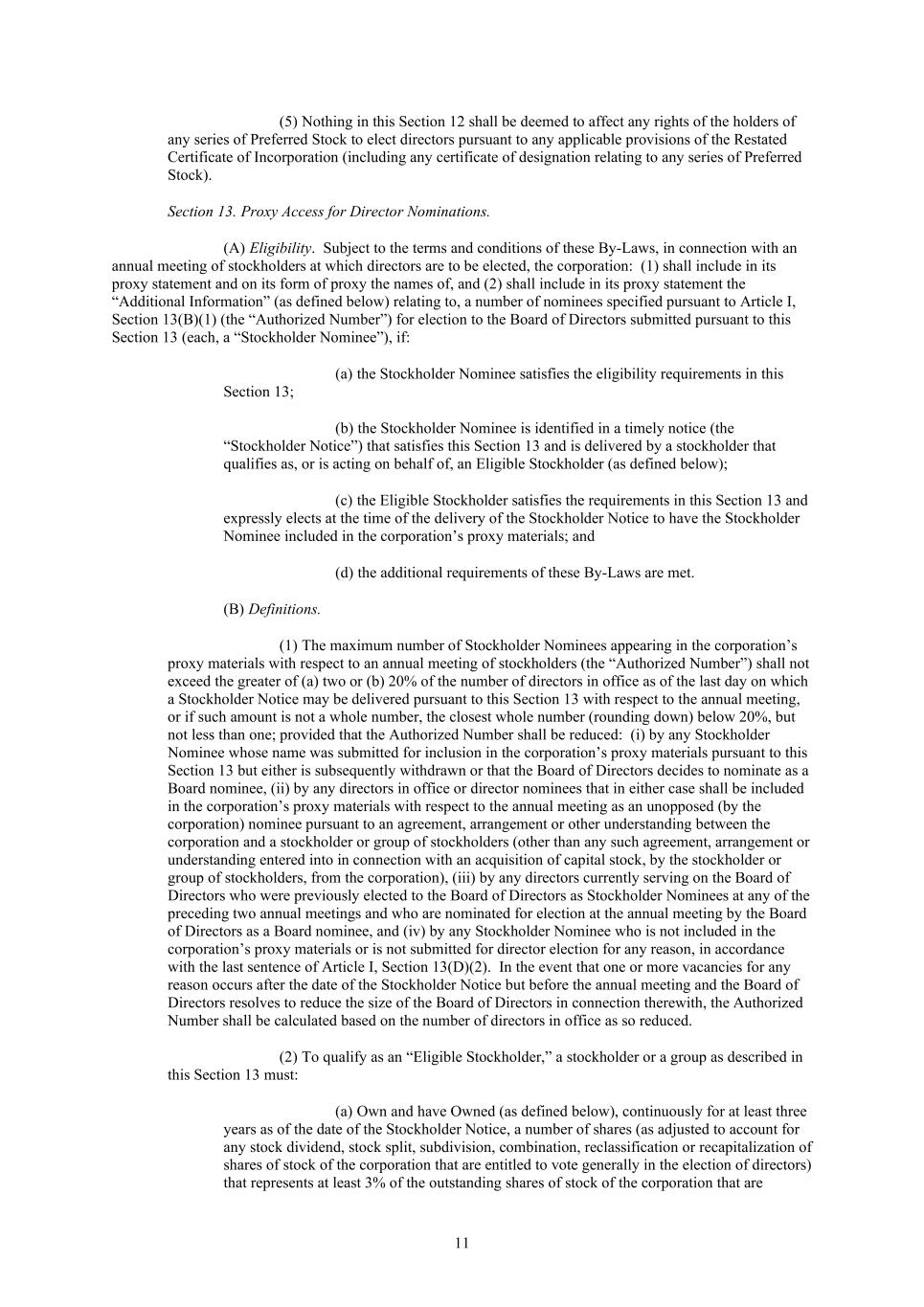
11 (5) Nothing in this Section 12 shall be deemed to affect any rights of the holders of any series of Preferred Stock to elect directors pursuant to any applicable provisions of the Restated Certificate of Incorporation (including any certificate of designation relating to any series of Preferred Stock). Section 13. Proxy Access for Director Nominations. (A) Eligibility. Subject to the terms and conditions of these By-Laws, in connection with an annual meeting of stockholders at which directors are to be elected, the corporation: (1) shall include in its proxy statement and on its form of proxy the names of, and (2) shall include in its proxy statement the “Additional Information” (as defined below) relating to, a number of nominees specified pursuant to Article I, Section 13(B)(1) (the “Authorized Number”) for election to the Board of Directors submitted pursuant to this Section 13 (each, a “Stockholder Nominee”), if: (a) the Stockholder Nominee satisfies the eligibility requirements in this Section 13; (b) the Stockholder Nominee is identified in a timely notice (the “Stockholder Notice”) that satisfies this Section 13 and is delivered by a stockholder that qualifies as, or is acting on behalf of, an Eligible Stockholder (as defined below); (c) the Eligible Stockholder satisfies the requirements in this Section 13 and expressly elects at the time of the delivery of the Stockholder Notice to have the Stockholder Nominee included in the corporation’s proxy materials; and (d) the additional requirements of these By-Laws are met. (B) Definitions. (1) The maximum number of Stockholder Nominees appearing in the corporation’s proxy materials with respect to an annual meeting of stockholders (the “Authorized Number”) shall not exceed the greater of (a) two or (b) 20% of the number of directors in office as of the last day on which a Stockholder Notice may be delivered pursuant to this Section 13 with respect to the annual meeting, or if such amount is not a whole number, the closest whole number (rounding down) below 20%, but not less than one; provided that the Authorized Number shall be reduced: (i) by any Stockholder Nominee whose name was submitted for inclusion in the corporation’s proxy materials pursuant to this Section 13 but either is subsequently withdrawn or that the Board of Directors decides to nominate as a Board nominee, (ii) by any directors in office or director nominees that in either case shall be included in the corporation’s proxy materials with respect to the annual meeting as an unopposed (by the corporation) nominee pursuant to an agreement, arrangement or other understanding between the corporation and a stockholder or group of stockholders (other than any such agreement, arrangement or understanding entered into in connection with an acquisition of capital stock, by the stockholder or group of stockholders, from the corporation), (iii) by any directors currently serving on the Board of Directors who were previously elected to the Board of Directors as Stockholder Nominees at any of the preceding two annual meetings and who are nominated for election at the annual meeting by the Board of Directors as a Board nominee, and (iv) by any Stockholder Nominee who is not included in the corporation’s proxy materials or is not submitted for director election for any reason, in accordance with the last sentence of Article I, Section 13(D)(2). In the event that one or more vacancies for any reason occurs after the date of the Stockholder Notice but before the annual meeting and the Board of Directors resolves to reduce the size of the Board of Directors in connection therewith, the Authorized Number shall be calculated based on the number of directors in office as so reduced. (2) To qualify as an “Eligible Stockholder,” a stockholder or a group as described in this Section 13 must: (a) Own and have Owned (as defined below), continuously for at least three years as of the date of the Stockholder Notice, a number of shares (as adjusted to account for any stock dividend, stock split, subdivision, combination, reclassification or recapitalization of shares of stock of the corporation that are entitled to vote generally in the election of directors) that represents at least 3% of the outstanding shares of stock of the corporation that are
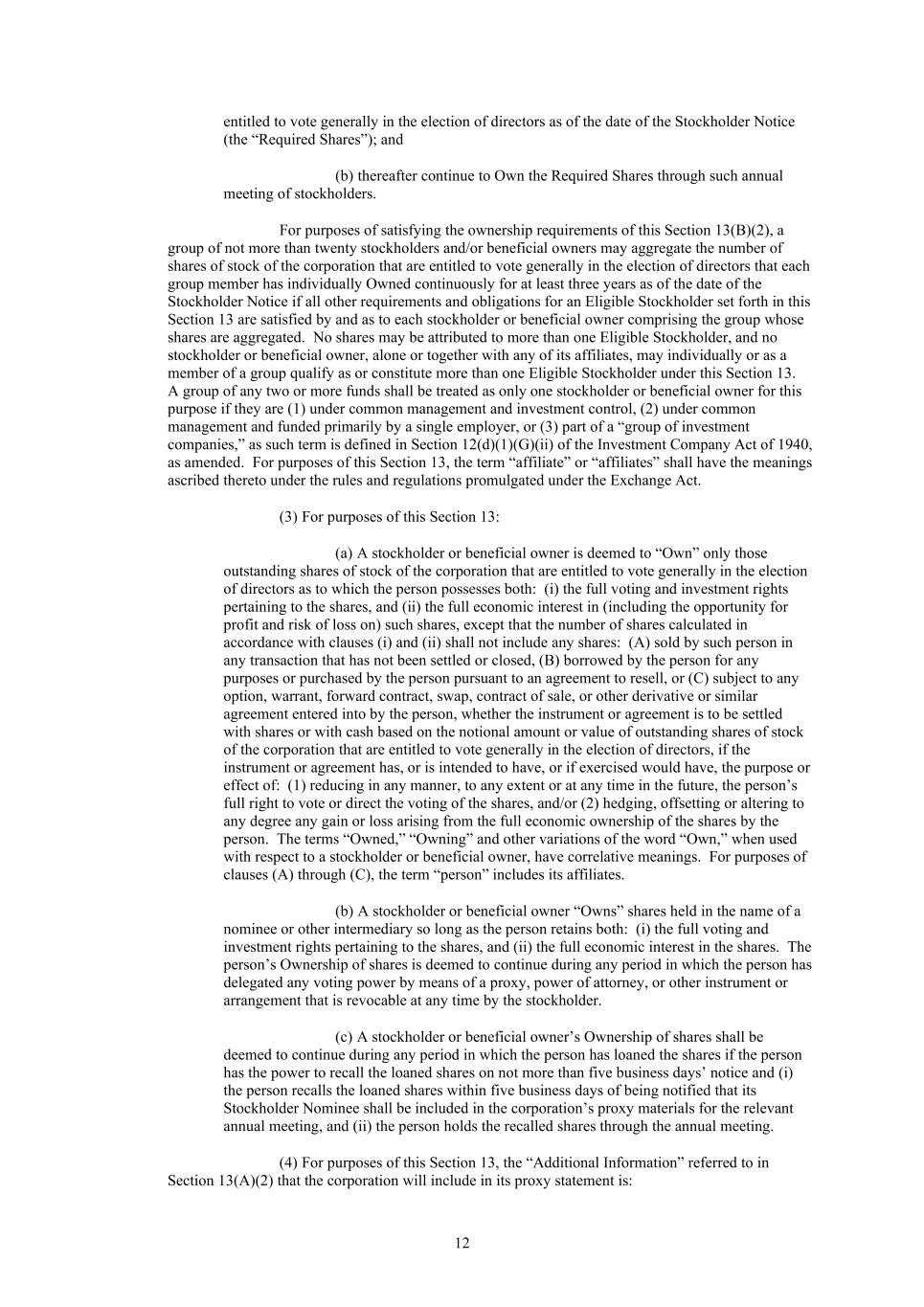
12 entitled to vote generally in the election of directors as of the date of the Stockholder Notice (the “Required Shares”); and (b) thereafter continue to Own the Required Shares through such annual meeting of stockholders. For purposes of satisfying the ownership requirements of this Section 13(B)(2), a group of not more than twenty stockholders and/or beneficial owners may aggregate the number of shares of stock of the corporation that are entitled to vote generally in the election of directors that each group member has individually Owned continuously for at least three years as of the date of the Stockholder Notice if all other requirements and obligations for an Eligible Stockholder set forth in this Section 13 are satisfied by and as to each stockholder or beneficial owner comprising the group whose shares are aggregated. No shares may be attributed to more than one Eligible Stockholder, and no stockholder or beneficial owner, alone or together with any of its affiliates, may individually or as a member of a group qualify as or constitute more than one Eligible Stockholder under this Section 13. A group of any two or more funds shall be treated as only one stockholder or beneficial owner for this purpose if they are (1) under common management and investment control, (2) under common management and funded primarily by a single employer, or (3) part of a “group of investment companies,” as such term is defined in Section 12(d)(1)(G)(ii) of the Investment Company Act of 1940, as amended. For purposes of this Section 13, the term “affiliate” or “affiliates” shall have the meanings ascribed thereto under the rules and regulations promulgated under the Exchange Act. (3) For purposes of this Section 13: (a) A stockholder or beneficial owner is deemed to “Own” only those outstanding shares of stock of the corporation that are entitled to vote generally in the election of directors as to which the person possesses both: (i) the full voting and investment rights pertaining to the shares, and (ii) the full economic interest in (including the opportunity for profit and risk of loss on) such shares, except that the number of shares calculated in accordance with clauses (i) and (ii) shall not include any shares: (A) sold by such person in any transaction that has not been settled or closed, (B) borrowed by the person for any purposes or purchased by the person pursuant to an agreement to resell, or (C) subject to any option, warrant, forward contract, swap, contract of sale, or other derivative or similar agreement entered into by the person, whether the instrument or agreement is to be settled with shares or with cash based on the notional amount or value of outstanding shares of stock of the corporation that are entitled to vote generally in the election of directors, if the instrument or agreement has, or is intended to have, or if exercised would have, the purpose or effect of: (1) reducing in any manner, to any extent or at any time in the future, the person’s full right to vote or direct the voting of the shares, and/or (2) hedging, offsetting or altering to any degree any gain or loss arising from the full economic ownership of the shares by the person. The terms “Owned,” “Owning” and other variations of the word “Own,” when used with respect to a stockholder or beneficial owner, have correlative meanings. For purposes of clauses (A) through (C), the term “person” includes its affiliates. (b) A stockholder or beneficial owner “Owns” shares held in the name of a nominee or other intermediary so long as the person retains both: (i) the full voting and investment rights pertaining to the shares, and (ii) the full economic interest in the shares. The person’s Ownership of shares is deemed to continue during any period in which the person has delegated any voting power by means of a proxy, power of attorney, or other instrument or arrangement that is revocable at any time by the stockholder. (c) A stockholder or beneficial owner’s Ownership of shares shall be deemed to continue during any period in which the person has loaned the shares if the person has the power to recall the loaned shares on not more than five business days’ notice and (i) the person recalls the loaned shares within five business days of being notified that its Stockholder Nominee shall be included in the corporation’s proxy materials for the relevant annual meeting, and (ii) the person holds the recalled shares through the annual meeting. (4) For purposes of this Section 13, the “Additional Information” referred to in Section 13(A)(2) that the corporation will include in its proxy statement is:
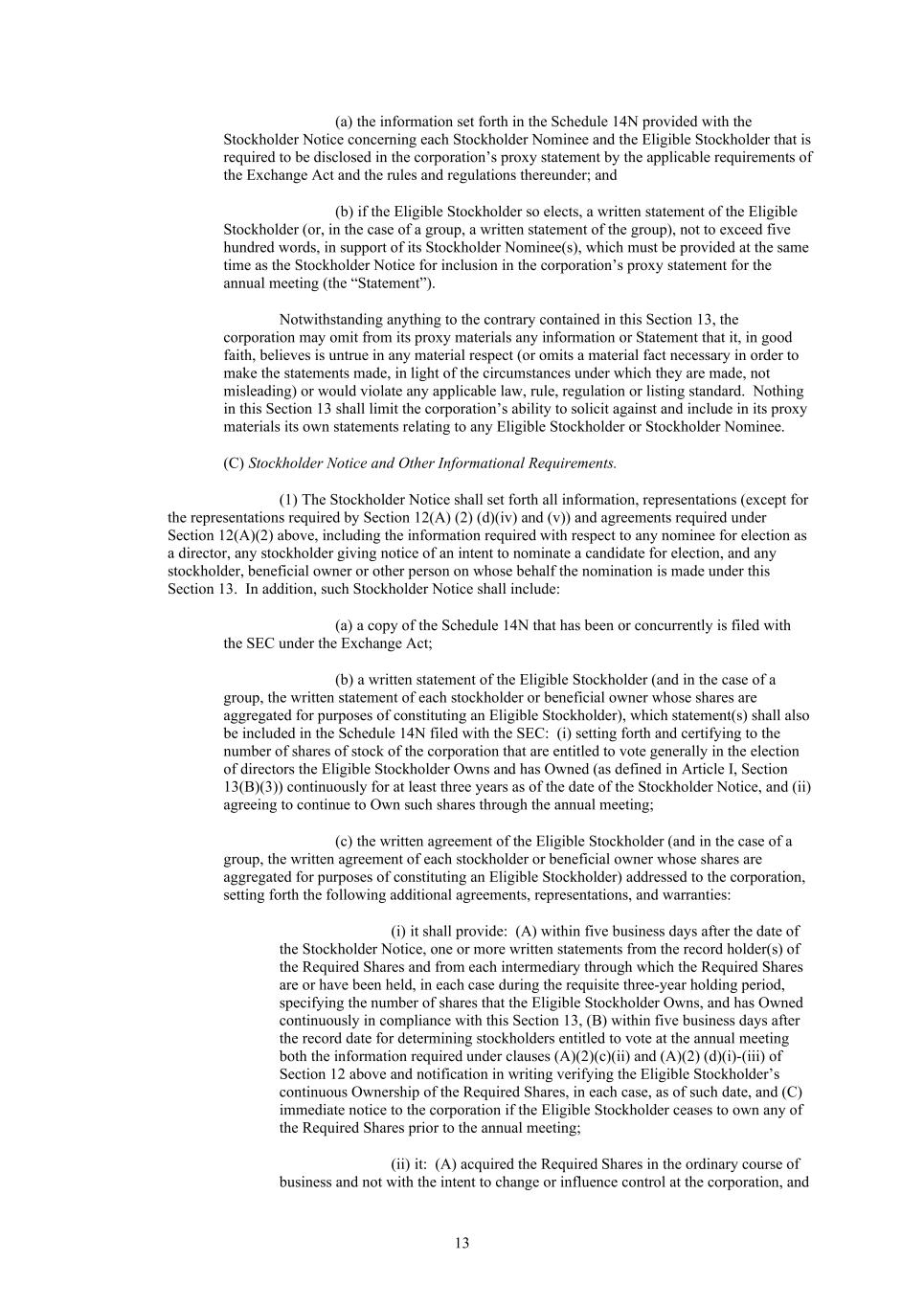
13 (a) the information set forth in the Schedule 14N provided with the Stockholder Notice concerning each Stockholder Nominee and the Eligible Stockholder that is required to be disclosed in the corporation’s proxy statement by the applicable requirements of the Exchange Act and the rules and regulations thereunder; and (b) if the Eligible Stockholder so elects, a written statement of the Eligible Stockholder (or, in the case of a group, a written statement of the group), not to exceed five hundred words, in support of its Stockholder Nominee(s), which must be provided at the same time as the Stockholder Notice for inclusion in the corporation’s proxy statement for the annual meeting (the “Statement”). Notwithstanding anything to the contrary contained in this Section 13, the corporation may omit from its proxy materials any information or Statement that it, in good faith, believes is untrue in any material respect (or omits a material fact necessary in order to make the statements made, in light of the circumstances under which they are made, not misleading) or would violate any applicable law, rule, regulation or listing standard. Nothing in this Section 13 shall limit the corporation’s ability to solicit against and include in its proxy materials its own statements relating to any Eligible Stockholder or Stockholder Nominee. (C) Stockholder Notice and Other Informational Requirements. (1) The Stockholder Notice shall set forth all information, representations (except for the representations required by Section 12(A) (2) (d)(iv) and (v)) and agreements required under Section 12(A)(2) above, including the information required with respect to any nominee for election as a director, any stockholder giving notice of an intent to nominate a candidate for election, and any stockholder, beneficial owner or other person on whose behalf the nomination is made under this Section 13. In addition, such Stockholder Notice shall include: (a) a copy of the Schedule 14N that has been or concurrently is filed with the SEC under the Exchange Act; (b) a written statement of the Eligible Stockholder (and in the case of a group, the written statement of each stockholder or beneficial owner whose shares are aggregated for purposes of constituting an Eligible Stockholder), which statement(s) shall also be included in the Schedule 14N filed with the SEC: (i) setting forth and certifying to the number of shares of stock of the corporation that are entitled to vote generally in the election of directors the Eligible Stockholder Owns and has Owned (as defined in Article I, Section 13(B)(3)) continuously for at least three years as of the date of the Stockholder Notice, and (ii) agreeing to continue to Own such shares through the annual meeting; (c) the written agreement of the Eligible Stockholder (and in the case of a group, the written agreement of each stockholder or beneficial owner whose shares are aggregated for purposes of constituting an Eligible Stockholder) addressed to the corporation, setting forth the following additional agreements, representations, and warranties: (i) it shall provide: (A) within five business days after the date of the Stockholder Notice, one or more written statements from the record holder(s) of the Required Shares and from each intermediary through which the Required Shares are or have been held, in each case during the requisite three-year holding period, specifying the number of shares that the Eligible Stockholder Owns, and has Owned continuously in compliance with this Section 13, (B) within five business days after the record date for determining stockholders entitled to vote at the annual meeting both the information required under clauses (A)(2)(c)(ii) and (A)(2) (d)(i)-(iii) of Section 12 above and notification in writing verifying the Eligible Stockholder’s continuous Ownership of the Required Shares, in each case, as of such date, and (C) immediate notice to the corporation if the Eligible Stockholder ceases to own any of the Required Shares prior to the annual meeting; (ii) it: (A) acquired the Required Shares in the ordinary course of business and not with the intent to change or influence control at the corporation, and
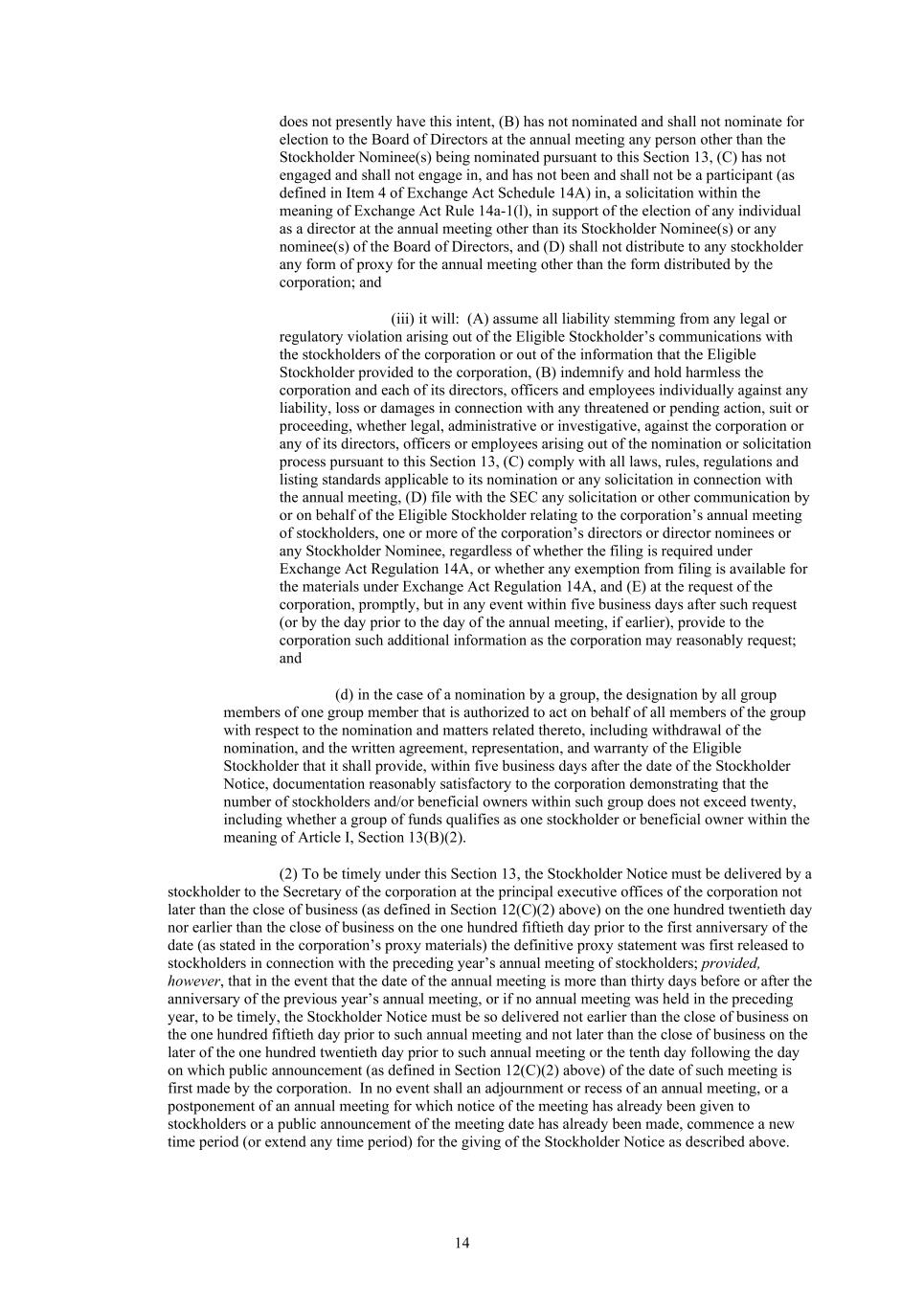
14 does not presently have this intent, (B) has not nominated and shall not nominate for election to the Board of Directors at the annual meeting any person other than the Stockholder Nominee(s) being nominated pursuant to this Section 13, (C) has not engaged and shall not engage in, and has not been and shall not be a participant (as defined in Item 4 of Exchange Act Schedule 14A) in, a solicitation within the meaning of Exchange Act Rule 14a-1(l), in support of the election of any individual as a director at the annual meeting other than its Stockholder Nominee(s) or any nominee(s) of the Board of Directors, and (D) shall not distribute to any stockholder any form of proxy for the annual meeting other than the form distributed by the corporation; and (iii) it will: (A) assume all liability stemming from any legal or regulatory violation arising out of the Eligible Stockholder’s communications with the stockholders of the corporation or out of the information that the Eligible Stockholder provided to the corporation, (B) indemnify and hold harmless the corporation and each of its directors, officers and employees individually against any liability, loss or damages in connection with any threatened or pending action, suit or proceeding, whether legal, administrative or investigative, against the corporation or any of its directors, officers or employees arising out of the nomination or solicitation process pursuant to this Section 13, (C) comply with all laws, rules, regulations and listing standards applicable to its nomination or any solicitation in connection with the annual meeting, (D) file with the SEC any solicitation or other communication by or on behalf of the Eligible Stockholder relating to the corporation’s annual meeting of stockholders, one or more of the corporation’s directors or director nominees or any Stockholder Nominee, regardless of whether the filing is required under Exchange Act Regulation 14A, or whether any exemption from filing is available for the materials under Exchange Act Regulation 14A, and (E) at the request of the corporation, promptly, but in any event within five business days after such request (or by the day prior to the day of the annual meeting, if earlier), provide to the corporation such additional information as the corporation may reasonably request; and (d) in the case of a nomination by a group, the designation by all group members of one group member that is authorized to act on behalf of all members of the group with respect to the nomination and matters related thereto, including withdrawal of the nomination, and the written agreement, representation, and warranty of the Eligible Stockholder that it shall provide, within five business days after the date of the Stockholder Notice, documentation reasonably satisfactory to the corporation demonstrating that the number of stockholders and/or beneficial owners within such group does not exceed twenty, including whether a group of funds qualifies as one stockholder or beneficial owner within the meaning of Article I, Section 13(B)(2). (2) To be timely under this Section 13, the Stockholder Notice must be delivered by a stockholder to the Secretary of the corporation at the principal executive offices of the corporation not later than the close of business (as defined in Section 12(C)(2) above) on the one hundred twentieth day nor earlier than the close of business on the one hundred fiftieth day prior to the first anniversary of the date (as stated in the corporation’s proxy materials) the definitive proxy statement was first released to stockholders in connection with the preceding year’s annual meeting of stockholders; provided, however, that in the event that the date of the annual meeting is more than thirty days before or after the anniversary of the previous year’s annual meeting, or if no annual meeting was held in the preceding year, to be timely, the Stockholder Notice must be so delivered not earlier than the close of business on the one hundred fiftieth day prior to such annual meeting and not later than the close of business on the later of the one hundred twentieth day prior to such annual meeting or the tenth day following the day on which public announcement (as defined in Section 12(C)(2) above) of the date of such meeting is first made by the corporation. In no event shall an adjournment or recess of an annual meeting, or a postponement of an annual meeting for which notice of the meeting has already been given to stockholders or a public announcement of the meeting date has already been made, commence a new time period (or extend any time period) for the giving of the Stockholder Notice as described above.
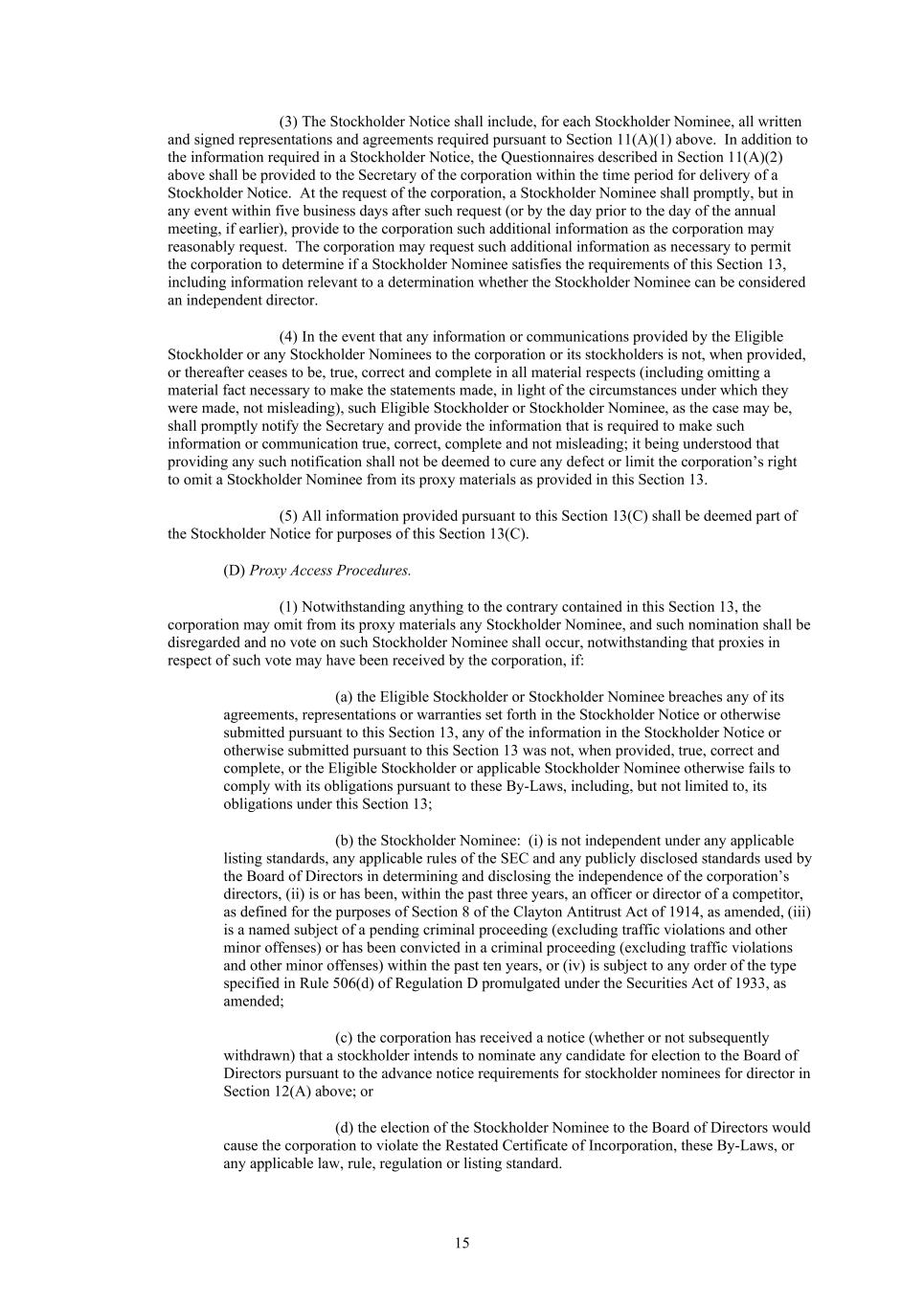
15 (3) The Stockholder Notice shall include, for each Stockholder Nominee, all written and signed representations and agreements required pursuant to Section 11(A)(1) above. In addition to the information required in a Stockholder Notice, the Questionnaires described in Section 11(A)(2) above shall be provided to the Secretary of the corporation within the time period for delivery of a Stockholder Notice. At the request of the corporation, a Stockholder Nominee shall promptly, but in any event within five business days after such request (or by the day prior to the day of the annual meeting, if earlier), provide to the corporation such additional information as the corporation may reasonably request. The corporation may request such additional information as necessary to permit the corporation to determine if a Stockholder Nominee satisfies the requirements of this Section 13, including information relevant to a determination whether the Stockholder Nominee can be considered an independent director. (4) In the event that any information or communications provided by the Eligible Stockholder or any Stockholder Nominees to the corporation or its stockholders is not, when provided, or thereafter ceases to be, true, correct and complete in all material respects (including omitting a material fact necessary to make the statements made, in light of the circumstances under which they were made, not misleading), such Eligible Stockholder or Stockholder Nominee, as the case may be, shall promptly notify the Secretary and provide the information that is required to make such information or communication true, correct, complete and not misleading; it being understood that providing any such notification shall not be deemed to cure any defect or limit the corporation’s right to omit a Stockholder Nominee from its proxy materials as provided in this Section 13. (5) All information provided pursuant to this Section 13(C) shall be deemed part of the Stockholder Notice for purposes of this Section 13(C). (D) Proxy Access Procedures. (1) Notwithstanding anything to the contrary contained in this Section 13, the corporation may omit from its proxy materials any Stockholder Nominee, and such nomination shall be disregarded and no vote on such Stockholder Nominee shall occur, notwithstanding that proxies in respect of such vote may have been received by the corporation, if: (a) the Eligible Stockholder or Stockholder Nominee breaches any of its agreements, representations or warranties set forth in the Stockholder Notice or otherwise submitted pursuant to this Section 13, any of the information in the Stockholder Notice or otherwise submitted pursuant to this Section 13 was not, when provided, true, correct and complete, or the Eligible Stockholder or applicable Stockholder Nominee otherwise fails to comply with its obligations pursuant to these By-Laws, including, but not limited to, its obligations under this Section 13; (b) the Stockholder Nominee: (i) is not independent under any applicable listing standards, any applicable rules of the SEC and any publicly disclosed standards used by the Board of Directors in determining and disclosing the independence of the corporation’s directors, (ii) is or has been, within the past three years, an officer or director of a competitor, as defined for the purposes of Section 8 of the Clayton Antitrust Act of 1914, as amended, (iii) is a named subject of a pending criminal proceeding (excluding traffic violations and other minor offenses) or has been convicted in a criminal proceeding (excluding traffic violations and other minor offenses) within the past ten years, or (iv) is subject to any order of the type specified in Rule 506(d) of Regulation D promulgated under the Securities Act of 1933, as amended; (c) the corporation has received a notice (whether or not subsequently withdrawn) that a stockholder intends to nominate any candidate for election to the Board of Directors pursuant to the advance notice requirements for stockholder nominees for director in Section 12(A) above; or (d) the election of the Stockholder Nominee to the Board of Directors would cause the corporation to violate the Restated Certificate of Incorporation, these By-Laws, or any applicable law, rule, regulation or listing standard.
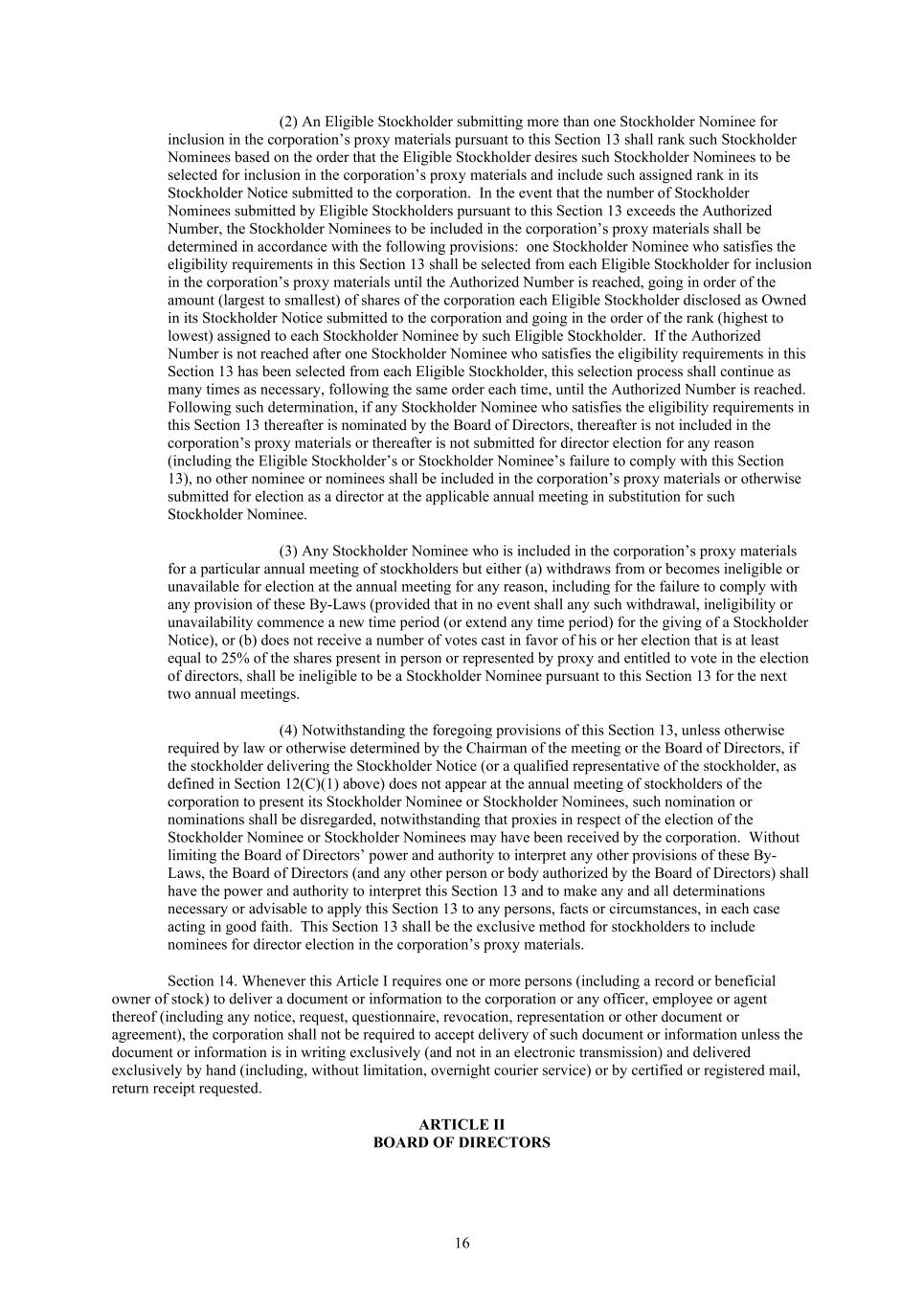
16 (2) An Eligible Stockholder submitting more than one Stockholder Nominee for inclusion in the corporation’s proxy materials pursuant to this Section 13 shall rank such Stockholder Nominees based on the order that the Eligible Stockholder desires such Stockholder Nominees to be selected for inclusion in the corporation’s proxy materials and include such assigned rank in its Stockholder Notice submitted to the corporation. In the event that the number of Stockholder Nominees submitted by Eligible Stockholders pursuant to this Section 13 exceeds the Authorized Number, the Stockholder Nominees to be included in the corporation’s proxy materials shall be determined in accordance with the following provisions: one Stockholder Nominee who satisfies the eligibility requirements in this Section 13 shall be selected from each Eligible Stockholder for inclusion in the corporation’s proxy materials until the Authorized Number is reached, going in order of the amount (largest to smallest) of shares of the corporation each Eligible Stockholder disclosed as Owned in its Stockholder Notice submitted to the corporation and going in the order of the rank (highest to lowest) assigned to each Stockholder Nominee by such Eligible Stockholder. If the Authorized Number is not reached after one Stockholder Nominee who satisfies the eligibility requirements in this Section 13 has been selected from each Eligible Stockholder, this selection process shall continue as many times as necessary, following the same order each time, until the Authorized Number is reached. Following such determination, if any Stockholder Nominee who satisfies the eligibility requirements in this Section 13 thereafter is nominated by the Board of Directors, thereafter is not included in the corporation’s proxy materials or thereafter is not submitted for director election for any reason (including the Eligible Stockholder’s or Stockholder Nominee’s failure to comply with this Section 13), no other nominee or nominees shall be included in the corporation’s proxy materials or otherwise submitted for election as a director at the applicable annual meeting in substitution for such Stockholder Nominee. (3) Any Stockholder Nominee who is included in the corporation’s proxy materials for a particular annual meeting of stockholders but either (a) withdraws from or becomes ineligible or unavailable for election at the annual meeting for any reason, including for the failure to comply with any provision of these By-Laws (provided that in no event shall any such withdrawal, ineligibility or unavailability commence a new time period (or extend any time period) for the giving of a Stockholder Notice), or (b) does not receive a number of votes cast in favor of his or her election that is at least equal to 25% of the shares present in person or represented by proxy and entitled to vote in the election of directors, shall be ineligible to be a Stockholder Nominee pursuant to this Section 13 for the next two annual meetings. (4) Notwithstanding the foregoing provisions of this Section 13, unless otherwise required by law or otherwise determined by the Chairman of the meeting or the Board of Directors, if the stockholder delivering the Stockholder Notice (or a qualified representative of the stockholder, as defined in Section 12(C)(1) above) does not appear at the annual meeting of stockholders of the corporation to present its Stockholder Nominee or Stockholder Nominees, such nomination or nominations shall be disregarded, notwithstanding that proxies in respect of the election of the Stockholder Nominee or Stockholder Nominees may have been received by the corporation. Without limiting the Board of Directors’ power and authority to interpret any other provisions of these By- Laws, the Board of Directors (and any other person or body authorized by the Board of Directors) shall have the power and authority to interpret this Section 13 and to make any and all determinations necessary or advisable to apply this Section 13 to any persons, facts or circumstances, in each case acting in good faith. This Section 13 shall be the exclusive method for stockholders to include nominees for director election in the corporation’s proxy materials. Section 14. Whenever this Article I requires one or more persons (including a record or beneficial owner of stock) to deliver a document or information to the corporation or any officer, employee or agent thereof (including any notice, request, questionnaire, revocation, representation or other document or agreement), the corporation shall not be required to accept delivery of such document or information unless the document or information is in writing exclusively (and not in an electronic transmission) and delivered exclusively by hand (including, without limitation, overnight courier service) or by certified or registered mail, return receipt requested. ARTICLE II BOARD OF DIRECTORS
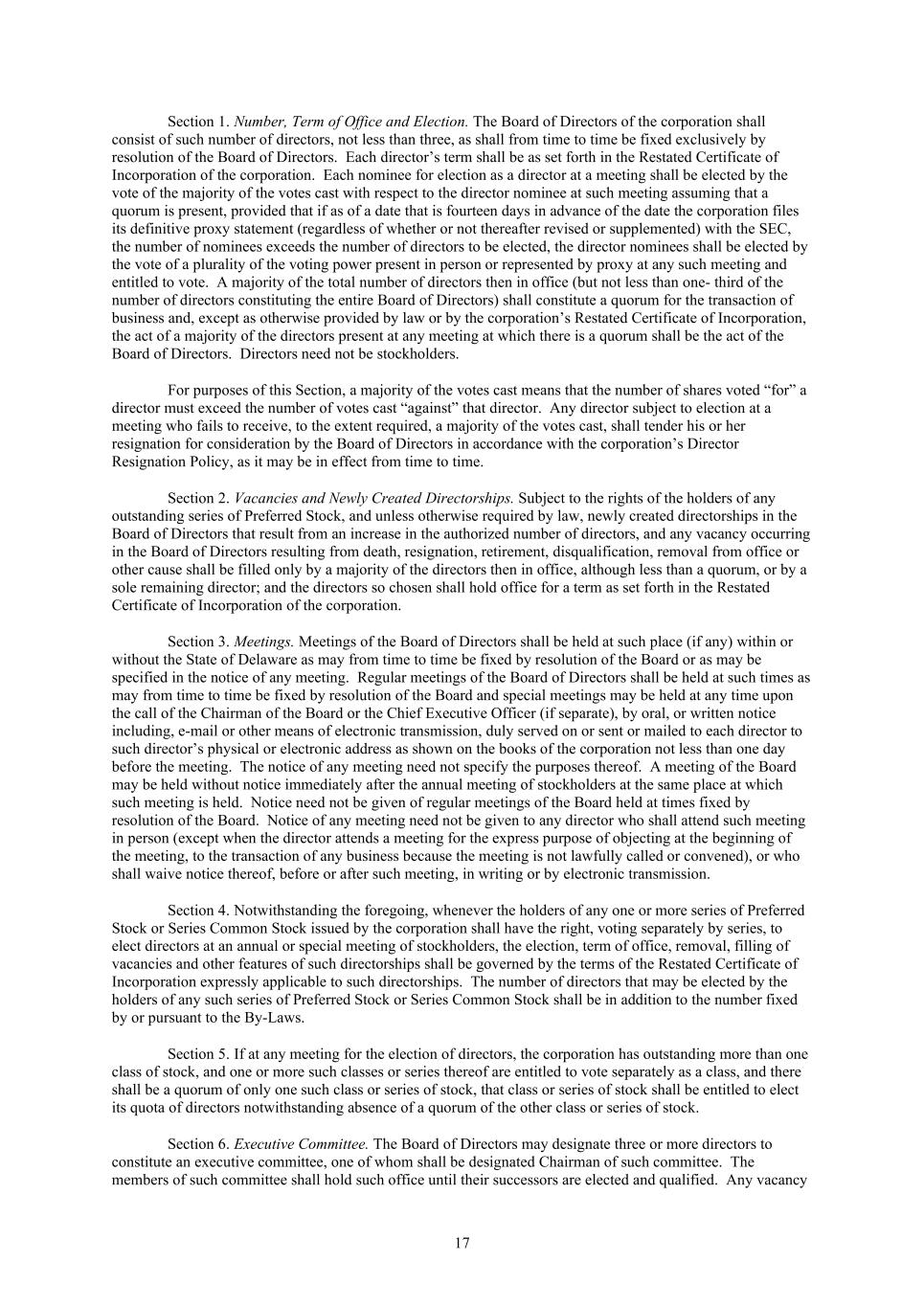
17 Section 1. Number, Term of Office and Election. The Board of Directors of the corporation shall consist of such number of directors, not less than three, as shall from time to time be fixed exclusively by resolution of the Board of Directors. Each director’s term shall be as set forth in the Restated Certificate of Incorporation of the corporation. Each nominee for election as a director at a meeting shall be elected by the vote of the majority of the votes cast with respect to the director nominee at such meeting assuming that a quorum is present, provided that if as of a date that is fourteen days in advance of the date the corporation files its definitive proxy statement (regardless of whether or not thereafter revised or supplemented) with the SEC, the number of nominees exceeds the number of directors to be elected, the director nominees shall be elected by the vote of a plurality of the voting power present in person or represented by proxy at any such meeting and entitled to vote. A majority of the total number of directors then in office (but not less than one- third of the number of directors constituting the entire Board of Directors) shall constitute a quorum for the transaction of business and, except as otherwise provided by law or by the corporation’s Restated Certificate of Incorporation, the act of a majority of the directors present at any meeting at which there is a quorum shall be the act of the Board of Directors. Directors need not be stockholders. For purposes of this Section, a majority of the votes cast means that the number of shares voted “for” a director must exceed the number of votes cast “against” that director. Any director subject to election at a meeting who fails to receive, to the extent required, a majority of the votes cast, shall tender his or her resignation for consideration by the Board of Directors in accordance with the corporation’s Director Resignation Policy, as it may be in effect from time to time. Section 2. Vacancies and Newly Created Directorships. Subject to the rights of the holders of any outstanding series of Preferred Stock, and unless otherwise required by law, newly created directorships in the Board of Directors that result from an increase in the authorized number of directors, and any vacancy occurring in the Board of Directors resulting from death, resignation, retirement, disqualification, removal from office or other cause shall be filled only by a majority of the directors then in office, although less than a quorum, or by a sole remaining director; and the directors so chosen shall hold office for a term as set forth in the Restated Certificate of Incorporation of the corporation. Section 3. Meetings. Meetings of the Board of Directors shall be held at such place (if any) within or without the State of Delaware as may from time to time be fixed by resolution of the Board or as may be specified in the notice of any meeting. Regular meetings of the Board of Directors shall be held at such times as may from time to time be fixed by resolution of the Board and special meetings may be held at any time upon the call of the Chairman of the Board or the Chief Executive Officer (if separate), by oral, or written notice including, e-mail or other means of electronic transmission, duly served on or sent or mailed to each director to such director’s physical or electronic address as shown on the books of the corporation not less than one day before the meeting. The notice of any meeting need not specify the purposes thereof. A meeting of the Board may be held without notice immediately after the annual meeting of stockholders at the same place at which such meeting is held. Notice need not be given of regular meetings of the Board held at times fixed by resolution of the Board. Notice of any meeting need not be given to any director who shall attend such meeting in person (except when the director attends a meeting for the express purpose of objecting at the beginning of the meeting, to the transaction of any business because the meeting is not lawfully called or convened), or who shall waive notice thereof, before or after such meeting, in writing or by electronic transmission. Section 4. Notwithstanding the foregoing, whenever the holders of any one or more series of Preferred Stock or Series Common Stock issued by the corporation shall have the right, voting separately by series, to elect directors at an annual or special meeting of stockholders, the election, term of office, removal, filling of vacancies and other features of such directorships shall be governed by the terms of the Restated Certificate of Incorporation expressly applicable to such directorships. The number of directors that may be elected by the holders of any such series of Preferred Stock or Series Common Stock shall be in addition to the number fixed by or pursuant to the By-Laws. Section 5. If at any meeting for the election of directors, the corporation has outstanding more than one class of stock, and one or more such classes or series thereof are entitled to vote separately as a class, and there shall be a quorum of only one such class or series of stock, that class or series of stock shall be entitled to elect its quota of directors notwithstanding absence of a quorum of the other class or series of stock. Section 6. Executive Committee. The Board of Directors may designate three or more directors to constitute an executive committee, one of whom shall be designated Chairman of such committee. The members of such committee shall hold such office until their successors are elected and qualified. Any vacancy
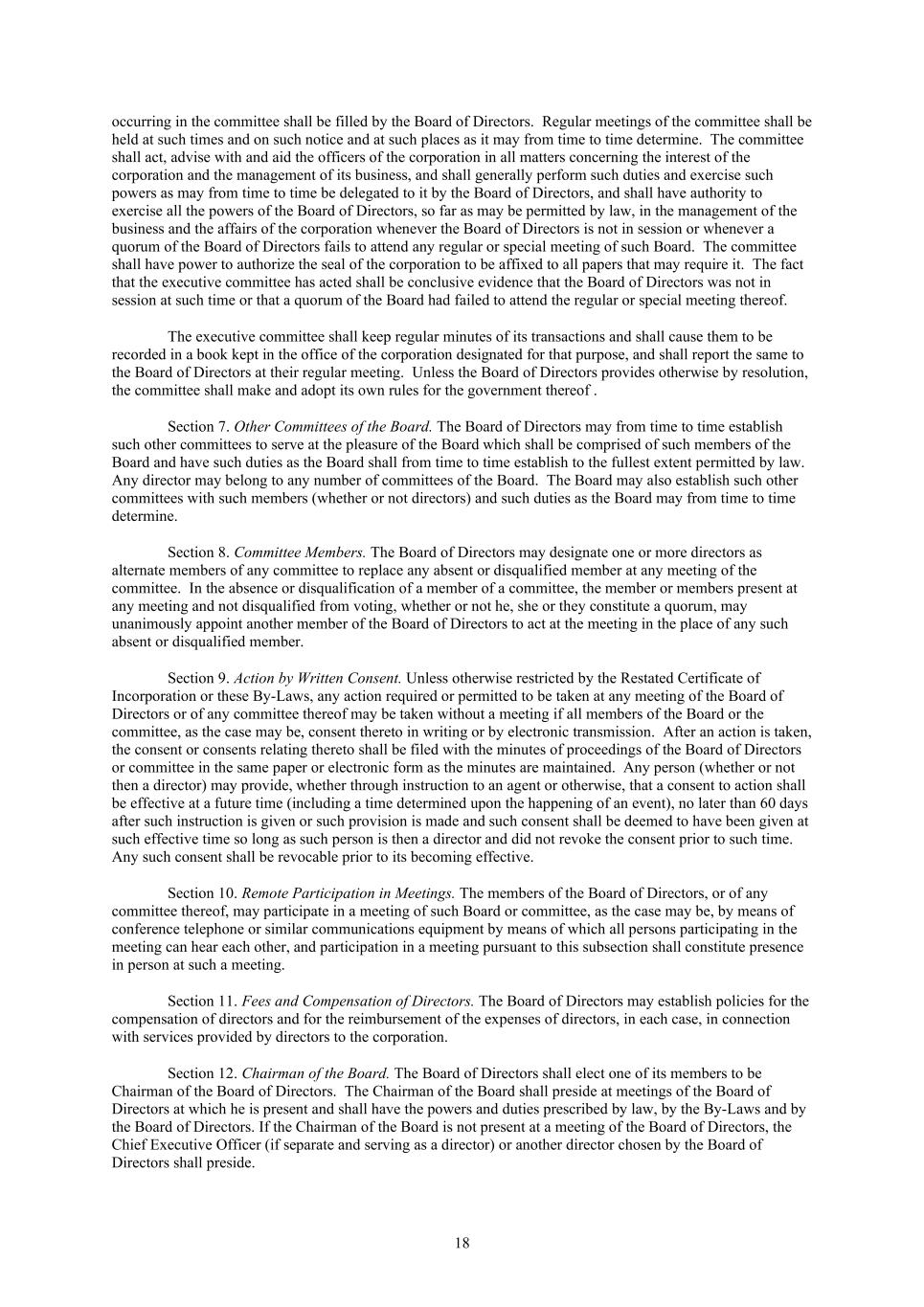
18 occurring in the committee shall be filled by the Board of Directors. Regular meetings of the committee shall be held at such times and on such notice and at such places as it may from time to time determine. The committee shall act, advise with and aid the officers of the corporation in all matters concerning the interest of the corporation and the management of its business, and shall generally perform such duties and exercise such powers as may from time to time be delegated to it by the Board of Directors, and shall have authority to exercise all the powers of the Board of Directors, so far as may be permitted by law, in the management of the business and the affairs of the corporation whenever the Board of Directors is not in session or whenever a quorum of the Board of Directors fails to attend any regular or special meeting of such Board. The committee shall have power to authorize the seal of the corporation to be affixed to all papers that may require it. The fact that the executive committee has acted shall be conclusive evidence that the Board of Directors was not in session at such time or that a quorum of the Board had failed to attend the regular or special meeting thereof. The executive committee shall keep regular minutes of its transactions and shall cause them to be recorded in a book kept in the office of the corporation designated for that purpose, and shall report the same to the Board of Directors at their regular meeting. Unless the Board of Directors provides otherwise by resolution, the committee shall make and adopt its own rules for the government thereof . Section 7. Other Committees of the Board. The Board of Directors may from time to time establish such other committees to serve at the pleasure of the Board which shall be comprised of such members of the Board and have such duties as the Board shall from time to time establish to the fullest extent permitted by law. Any director may belong to any number of committees of the Board. The Board may also establish such other committees with such members (whether or not directors) and such duties as the Board may from time to time determine. Section 8. Committee Members. The Board of Directors may designate one or more directors as alternate members of any committee to replace any absent or disqualified member at any meeting of the committee. In the absence or disqualification of a member of a committee, the member or members present at any meeting and not disqualified from voting, whether or not he, she or they constitute a quorum, may unanimously appoint another member of the Board of Directors to act at the meeting in the place of any such absent or disqualified member. Section 9. Action by Written Consent. Unless otherwise restricted by the Restated Certificate of Incorporation or these By-Laws, any action required or permitted to be taken at any meeting of the Board of Directors or of any committee thereof may be taken without a meeting if all members of the Board or the committee, as the case may be, consent thereto in writing or by electronic transmission. After an action is taken, the consent or consents relating thereto shall be filed with the minutes of proceedings of the Board of Directors or committee in the same paper or electronic form as the minutes are maintained. Any person (whether or not then a director) may provide, whether through instruction to an agent or otherwise, that a consent to action shall be effective at a future time (including a time determined upon the happening of an event), no later than 60 days after such instruction is given or such provision is made and such consent shall be deemed to have been given at such effective time so long as such person is then a director and did not revoke the consent prior to such time. Any such consent shall be revocable prior to its becoming effective. Section 10. Remote Participation in Meetings. The members of the Board of Directors, or of any committee thereof, may participate in a meeting of such Board or committee, as the case may be, by means of conference telephone or similar communications equipment by means of which all persons participating in the meeting can hear each other, and participation in a meeting pursuant to this subsection shall constitute presence in person at such a meeting. Section 11. Fees and Compensation of Directors. The Board of Directors may establish policies for the compensation of directors and for the reimbursement of the expenses of directors, in each case, in connection with services provided by directors to the corporation. Section 12. Chairman of the Board. The Board of Directors shall elect one of its members to be Chairman of the Board of Directors. The Chairman of the Board shall preside at meetings of the Board of Directors at which he is present and shall have the powers and duties prescribed by law, by the By-Laws and by the Board of Directors. If the Chairman of the Board is not present at a meeting of the Board of Directors, the Chief Executive Officer (if separate and serving as a director) or another director chosen by the Board of Directors shall preside.
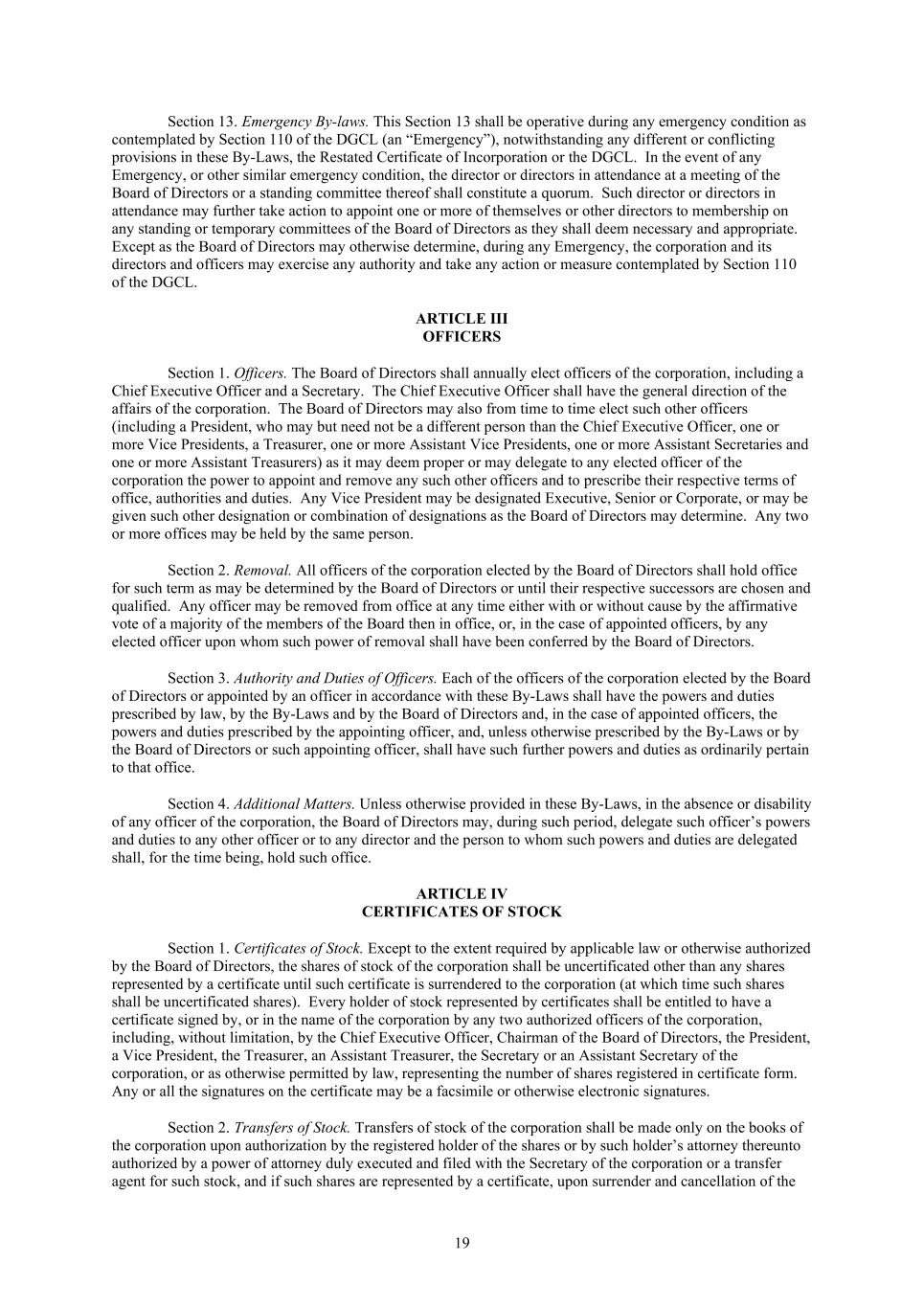
19 Section 13. Emergency By-laws. This Section 13 shall be operative during any emergency condition as contemplated by Section 110 of the DGCL (an “Emergency”), notwithstanding any different or conflicting provisions in these By-Laws, the Restated Certificate of Incorporation or the DGCL. In the event of any Emergency, or other similar emergency condition, the director or directors in attendance at a meeting of the Board of Directors or a standing committee thereof shall constitute a quorum. Such director or directors in attendance may further take action to appoint one or more of themselves or other directors to membership on any standing or temporary committees of the Board of Directors as they shall deem necessary and appropriate. Except as the Board of Directors may otherwise determine, during any Emergency, the corporation and its directors and officers may exercise any authority and take any action or measure contemplated by Section 110 of the DGCL. ARTICLE III OFFICERS Section 1. Officers. The Board of Directors shall annually elect officers of the corporation, including a Chief Executive Officer and a Secretary. The Chief Executive Officer shall have the general direction of the affairs of the corporation. The Board of Directors may also from time to time elect such other officers (including a President, who may but need not be a different person than the Chief Executive Officer, one or more Vice Presidents, a Treasurer, one or more Assistant Vice Presidents, one or more Assistant Secretaries and one or more Assistant Treasurers) as it may deem proper or may delegate to any elected officer of the corporation the power to appoint and remove any such other officers and to prescribe their respective terms of office, authorities and duties. Any Vice President may be designated Executive, Senior or Corporate, or may be given such other designation or combination of designations as the Board of Directors may determine. Any two or more offices may be held by the same person. Section 2. Removal. All officers of the corporation elected by the Board of Directors shall hold office for such term as may be determined by the Board of Directors or until their respective successors are chosen and qualified. Any officer may be removed from office at any time either with or without cause by the affirmative vote of a majority of the members of the Board then in office, or, in the case of appointed officers, by any elected officer upon whom such power of removal shall have been conferred by the Board of Directors. Section 3. Authority and Duties of Officers. Each of the officers of the corporation elected by the Board of Directors or appointed by an officer in accordance with these By-Laws shall have the powers and duties prescribed by law, by the By-Laws and by the Board of Directors and, in the case of appointed officers, the powers and duties prescribed by the appointing officer, and, unless otherwise prescribed by the By-Laws or by the Board of Directors or such appointing officer, shall have such further powers and duties as ordinarily pertain to that office. Section 4. Additional Matters. Unless otherwise provided in these By-Laws, in the absence or disability of any officer of the corporation, the Board of Directors may, during such period, delegate such officer’s powers and duties to any other officer or to any director and the person to whom such powers and duties are delegated shall, for the time being, hold such office. ARTICLE IV CERTIFICATES OF STOCK Section 1. Certificates of Stock. Except to the extent required by applicable law or otherwise authorized by the Board of Directors, the shares of stock of the corporation shall be uncertificated other than any shares represented by a certificate until such certificate is surrendered to the corporation (at which time such shares shall be uncertificated shares). Every holder of stock represented by certificates shall be entitled to have a certificate signed by, or in the name of the corporation by any two authorized officers of the corporation, including, without limitation, by the Chief Executive Officer, Chairman of the Board of Directors, the President, a Vice President, the Treasurer, an Assistant Treasurer, the Secretary or an Assistant Secretary of the corporation, or as otherwise permitted by law, representing the number of shares registered in certificate form. Any or all the signatures on the certificate may be a facsimile or otherwise electronic signatures. Section 2. Transfers of Stock. Transfers of stock of the corporation shall be made only on the books of the corporation upon authorization by the registered holder of the shares or by such holder’s attorney thereunto authorized by a power of attorney duly executed and filed with the Secretary of the corporation or a transfer agent for such stock, and if such shares are represented by a certificate, upon surrender and cancellation of the
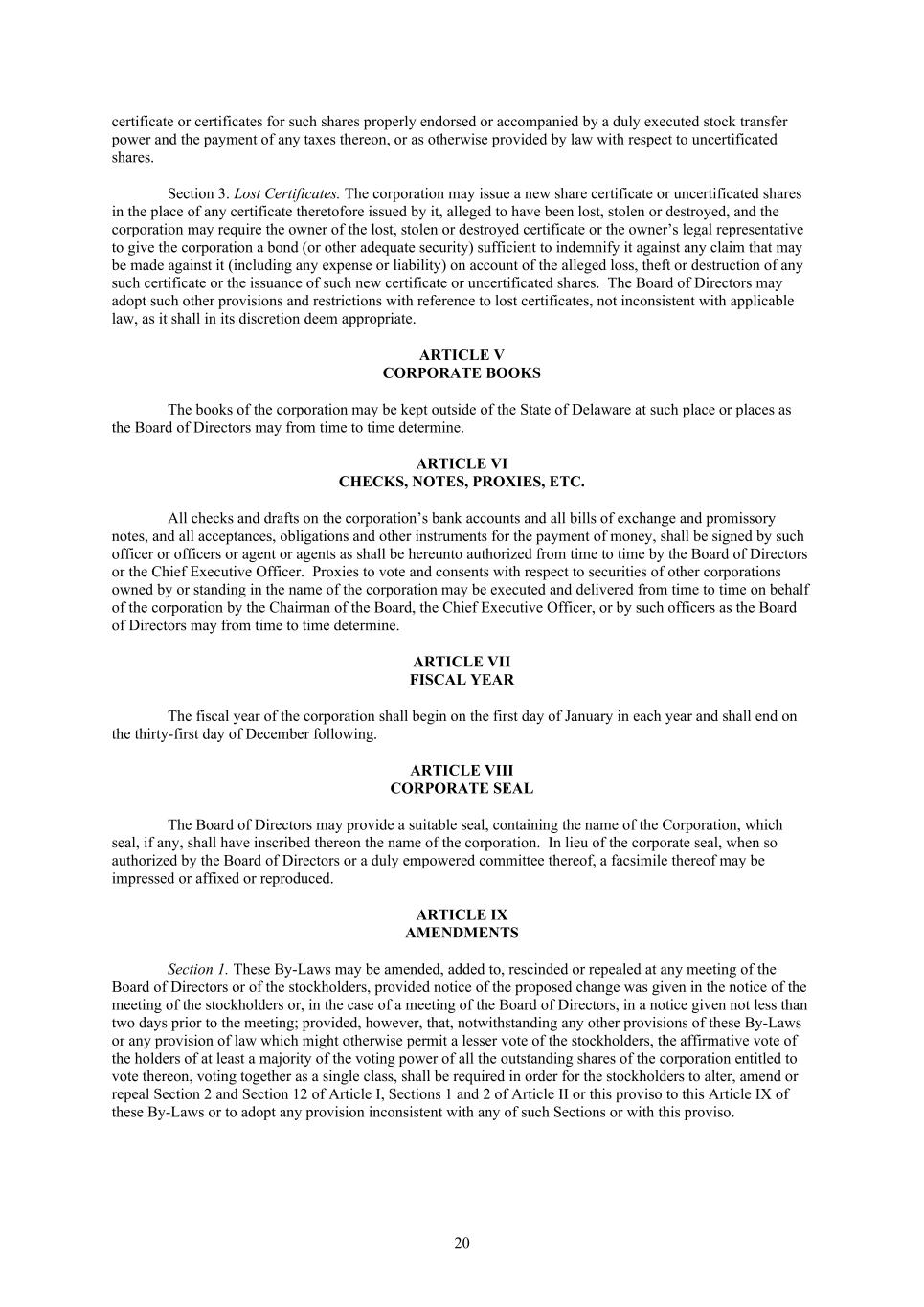
20 certificate or certificates for such shares properly endorsed or accompanied by a duly executed stock transfer power and the payment of any taxes thereon, or as otherwise provided by law with respect to uncertificated shares. Section 3. Lost Certificates. The corporation may issue a new share certificate or uncertificated shares in the place of any certificate theretofore issued by it, alleged to have been lost, stolen or destroyed, and the corporation may require the owner of the lost, stolen or destroyed certificate or the owner’s legal representative to give the corporation a bond (or other adequate security) sufficient to indemnify it against any claim that may be made against it (including any expense or liability) on account of the alleged loss, theft or destruction of any such certificate or the issuance of such new certificate or uncertificated shares. The Board of Directors may adopt such other provisions and restrictions with reference to lost certificates, not inconsistent with applicable law, as it shall in its discretion deem appropriate. ARTICLE V CORPORATE BOOKS The books of the corporation may be kept outside of the State of Delaware at such place or places as the Board of Directors may from time to time determine. ARTICLE VI CHECKS, NOTES, PROXIES, ETC. All checks and drafts on the corporation’s bank accounts and all bills of exchange and promissory notes, and all acceptances, obligations and other instruments for the payment of money, shall be signed by such officer or officers or agent or agents as shall be hereunto authorized from time to time by the Board of Directors or the Chief Executive Officer. Proxies to vote and consents with respect to securities of other corporations owned by or standing in the name of the corporation may be executed and delivered from time to time on behalf of the corporation by the Chairman of the Board, the Chief Executive Officer, or by such officers as the Board of Directors may from time to time determine. ARTICLE VII FISCAL YEAR The fiscal year of the corporation shall begin on the first day of January in each year and shall end on the thirty-first day of December following. ARTICLE VIII CORPORATE SEAL The Board of Directors may provide a suitable seal, containing the name of the Corporation, which seal, if any, shall have inscribed thereon the name of the corporation. In lieu of the corporate seal, when so authorized by the Board of Directors or a duly empowered committee thereof, a facsimile thereof may be impressed or affixed or reproduced. ARTICLE IX AMENDMENTS Section 1. These By-Laws may be amended, added to, rescinded or repealed at any meeting of the Board of Directors or of the stockholders, provided notice of the proposed change was given in the notice of the meeting of the stockholders or, in the case of a meeting of the Board of Directors, in a notice given not less than two days prior to the meeting; provided, however, that, notwithstanding any other provisions of these By-Laws or any provision of law which might otherwise permit a lesser vote of the stockholders, the affirmative vote of the holders of at least a majority of the voting power of all the outstanding shares of the corporation entitled to vote thereon, voting together as a single class, shall be required in order for the stockholders to alter, amend or repeal Section 2 and Section 12 of Article I, Sections 1 and 2 of Article II or this proviso to this Article IX of these By-Laws or to adopt any provision inconsistent with any of such Sections or with this proviso.